Chapter 3 — 2017-2018 in Focus: The Year in Military Prosecutions
Introduction
The information and analysis provided below reflects the workload of the CMPS pertaining to general file advice, pre-charge advice, post-charge review, custody review hearings, courts martial and appeals.
3.1 Overview
CMPS worked on a total of 199 referral files during the reporting period, 118 of which were received during the reporting period, and 81 which were carried over from FY 2016-201717. In addition, CMPS handled 129 pre-charges files and 14 appeals for a total number of files (pre-charge, referral and appeal files combined) of 342 files. This was the highest number of cases worked on by CMPS in five years.
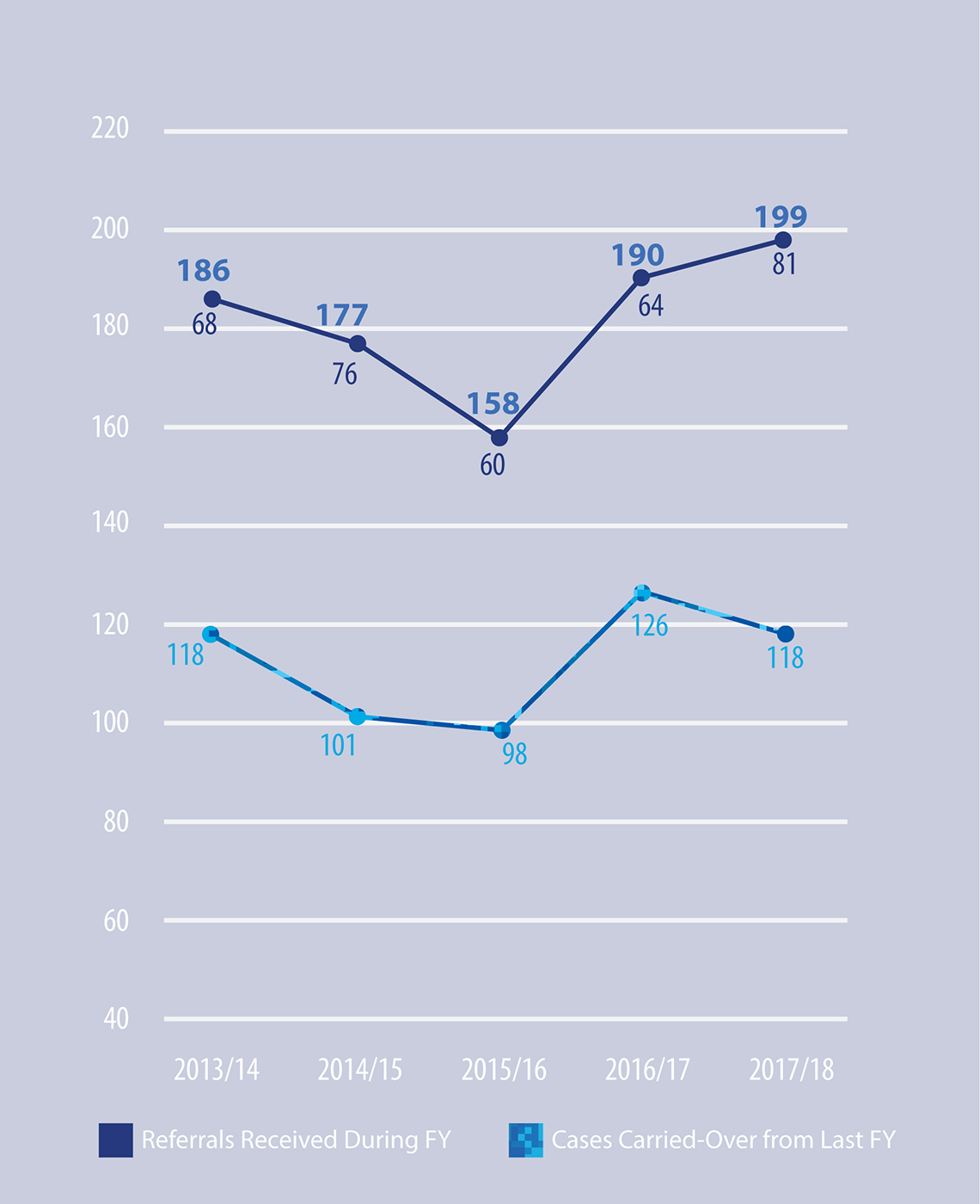
For graph breakdown, refer to the table below:
| 2013/14 | 2014/15 | 2015/16 | 2016/17 | 2017/18 | |
|---|---|---|---|---|---|
| Referrals Received during FY | 118 | 101 | 98 | 126 | 118 |
| Cases Carried-Over from Last FY | 68 | 76 | 60 | 64 | 81 |
| Total | 186 | 177 | 158 | 190 | 199 |
3.2 General File Advice
In addition to reviewing and prosecuting charges under the CSD, the CMPS provides general legal advice to the CFNIS pertaining to investigations and other disciplinary matters. CMPS is also frequently consulted by Deputy Judge Advocates (DJAs) who are responsible for advising Military Police (MP) detachments and CAF units in the conduct of disciplinary investigations. This advice is provide by both the CFNIS LA and the RMPs, and is not reflected in the caseload statistics contained in this report.
The CFNIS LA is a military prosecutor embedded with the CFNIS who provides dedicated legal advice to the CFNIS HQ in support of effective, timely and sound investigatory work, while respecting the necessary distinction between the investigative independence of the military police and the prosecutorial independence of the DMP. The CFNIS LA provides advice to investigators throughout all stages of an investigation. This proves essential in complex cases of cross-border operations where liaison and coordination with foreign police and prosecutorial entities are required. The CFNIS LA also provides the CFNIS with updates on criminal law developments and assists with systemic issues brought to light by individual cases, for example, by identifying deficiencies in policies, organizational structures, or unit processes.
RMPs will also provide advice to CFNIS investigators in the early stage of the investigation upon request, such as in the investigative planning stage or in the drafting of a search warrant. However, RMPs will ensure that they avoid direct involvement in the investigative process, as this may impair their ability to provide independent advice at the pre-charge screening stage.
3.3 Pre-Charge Advice
CMPS is responsible to provide pre-charge advice to the CFNIS, but also to DJA who are advising individual CAF units in matters of discipline. As per JAG Policy Directive 048/18 – Pre-Charge Screening, if the pre-charge review of the evidence reasonably supports the conclusion that a charge will not proceed by way of summary trial, but instead will be referred to court martial, the DJA shall consult with a RMP. In FY 2017-2018, a total of 129 pre-charge files were handled by CMPS; 126 were completed and 3 were still pending as of 31 March 2018.
In relation to the 126 pre-charge files completed during the reporting period, RMPs recommended that a charge or charges be laid in 57 of them (45% of total files completed).
59% of pre-charge files came from the CFNIS and 41% from DJAs during the reporting period.
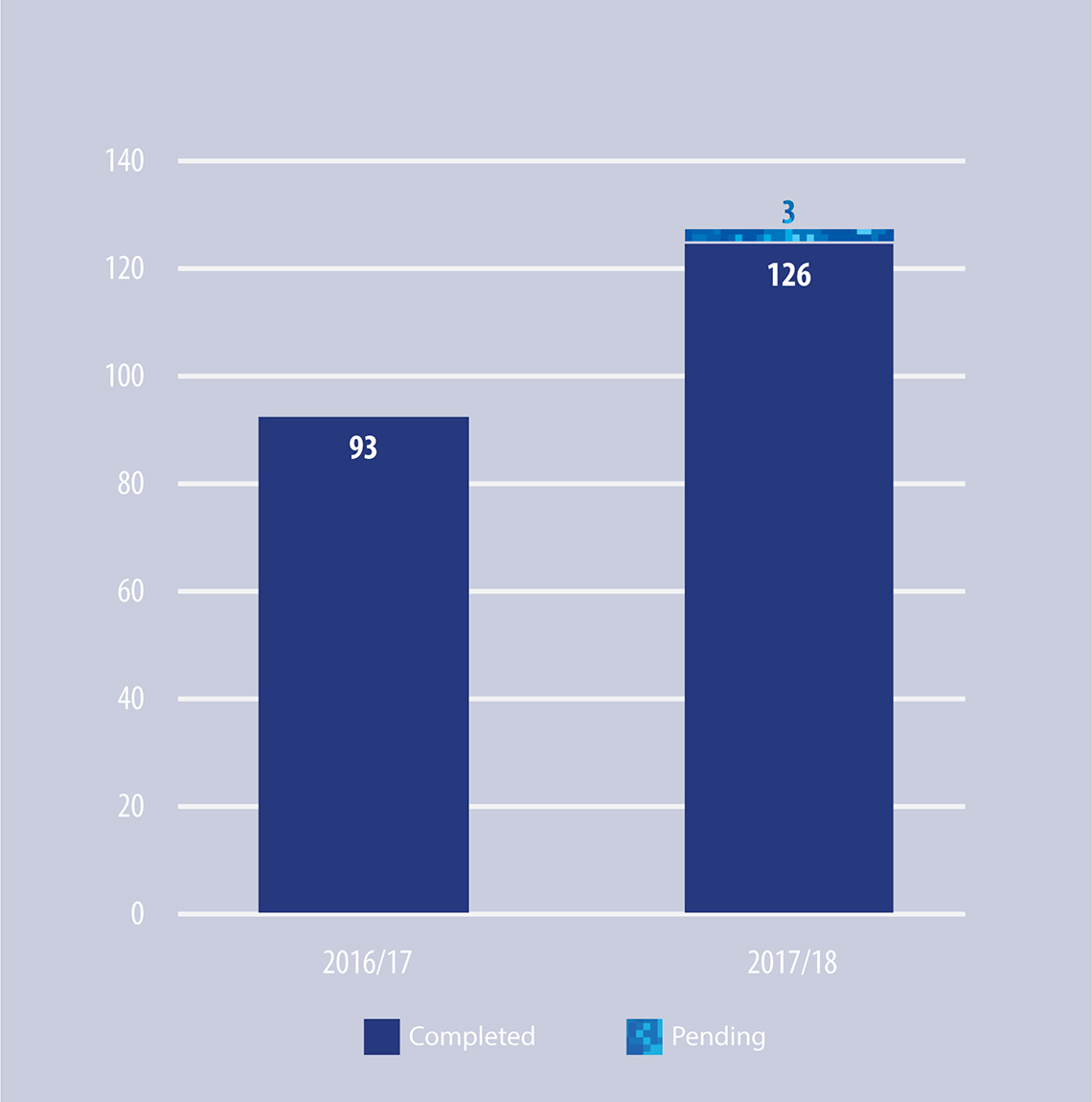
For graph breakdown, refer to the table below:
| 2016/17 | 2017/18 | |
|---|---|---|
| Completed | 93 | 126 |
| Pending | 0 | 3 |
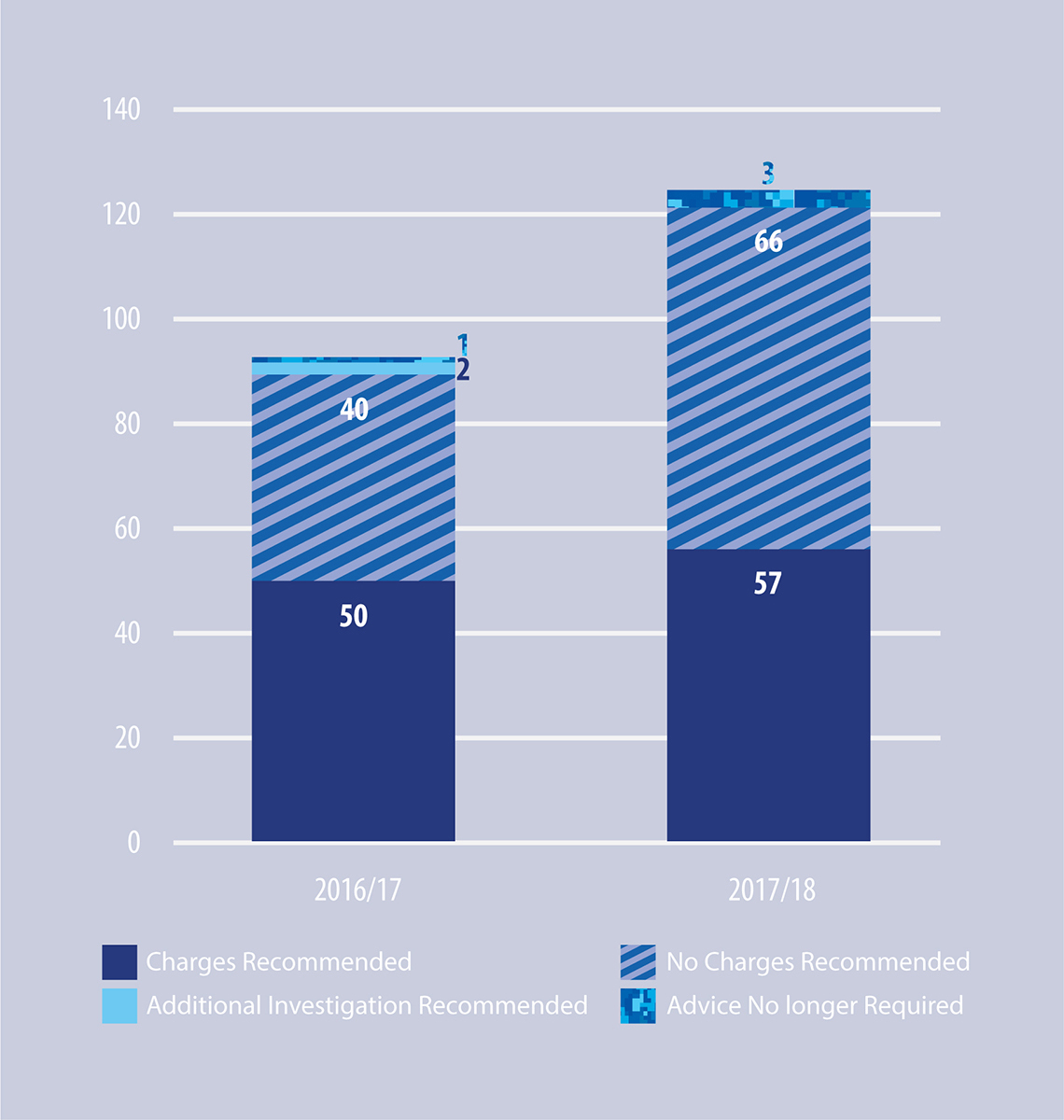
For graph breakdown, please refer to the table below:
| 2016/17 | 2017/18 | |
|---|---|---|
| Charges Recommended | 50 | 57 |
| No Charges Recommended | 40 | 66 |
| Additional Investigation Recommended | 2 | 0 |
| Advice No Longer Required | 1 | 3 |
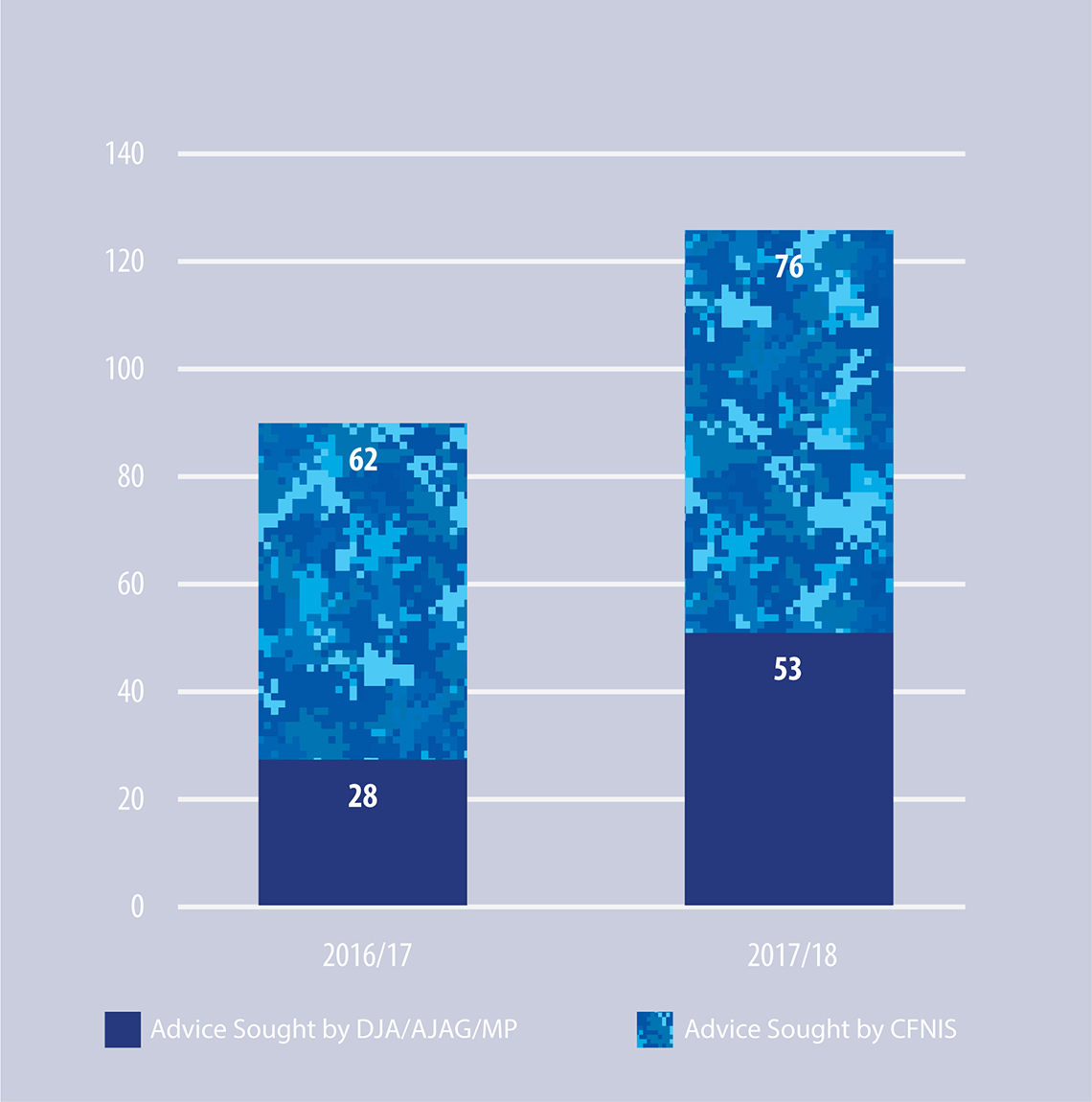
For graph breakdown, please refer to the table below:
| 2016/17 | 2017/18 | |
|---|---|---|
| Advice Sought by DJA/AJAG/MP | 28 | 53 |
| Advice Sought by CFNIS | 62 | 76 |
3.4 Files Referred to DMP
The number of files referred to DMP in the reporting period slightly decreased compared to the previous fiscal year (from 126 to 118). The yearly average over five years is 112 referrals. For referrals received in FY 2017-2018, 55 files led to charges being preferred for court martial, 41 files were not preferred and 22 files were still pending prosecutorial decision as of 31 March 2018.
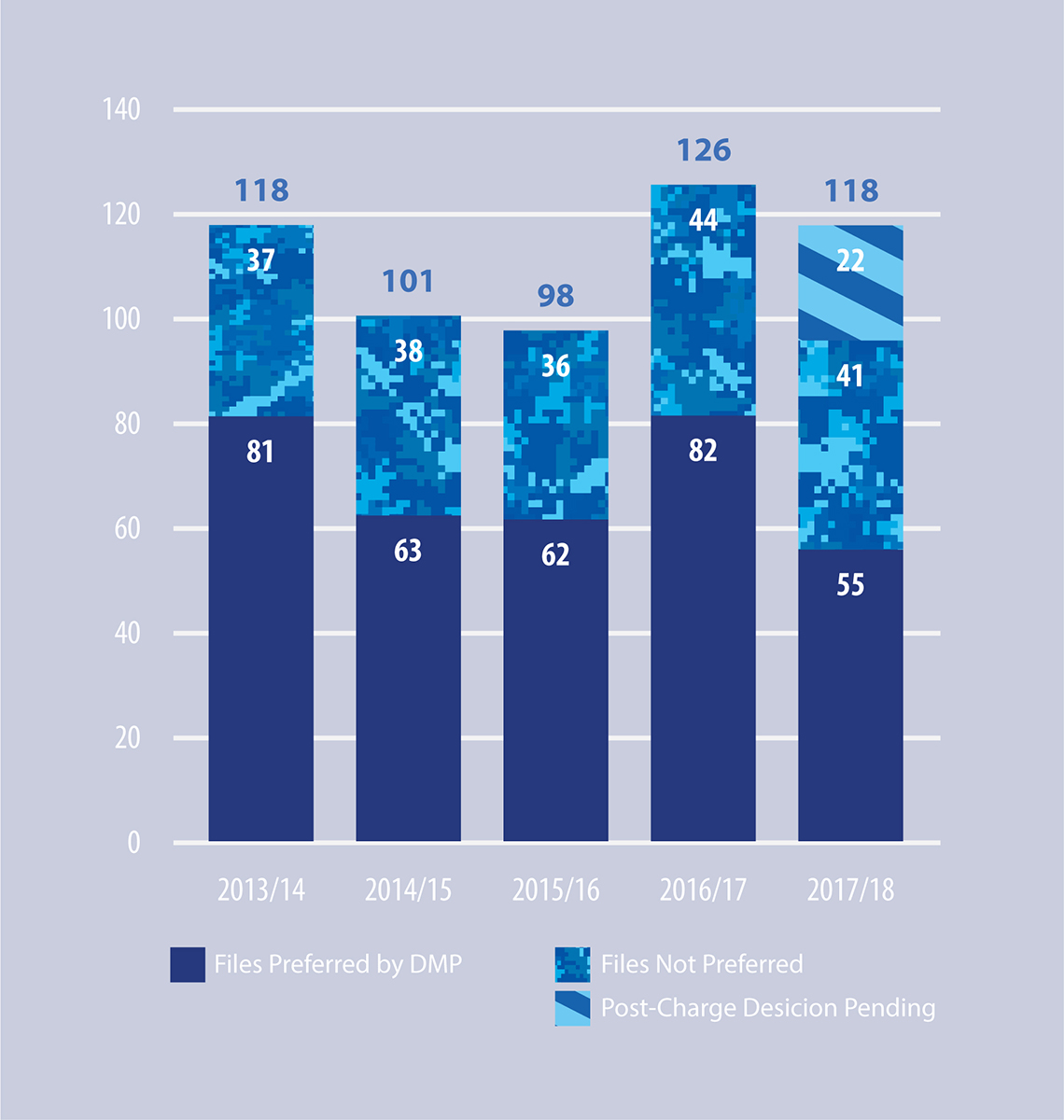
For graph breakdown, please refer to the table below:
| 2013/14 | 2014/15 | 2015/16 | 2016/17 | 2017/18 | |
|---|---|---|---|---|---|
| Files Preferred by DMP | 81 | 63 | 62 | 82 | 55 |
| Files Not Preferred | 37 | 38 | 36 | 44 | 41 |
| Post-Charge Decision Pending | 0 | 0 | 0 | 0 | 22 |
| Total | 118 | 101 | 98 | 126 | 118 |
Of the 199 referrals processed, 132 files were closed18 during the reporting period; a 21% increase at the post-charge stage over FY 2016-2017. Of the files that were not completely resolved as of 31 March 2018, 45 had charges preferred and were awaiting court martial completion and 22 were at the post-charge review stage.
Of the 132 referrals closed during the reporting period (of which 60 were received in FY 2017-2018 and 72 from previous FYs), 62 referrals were closed through the conclusion of court martial proceedings; 51 files resulted in non-preferral of charges and 19 cases resulted in withdrawal of charges.
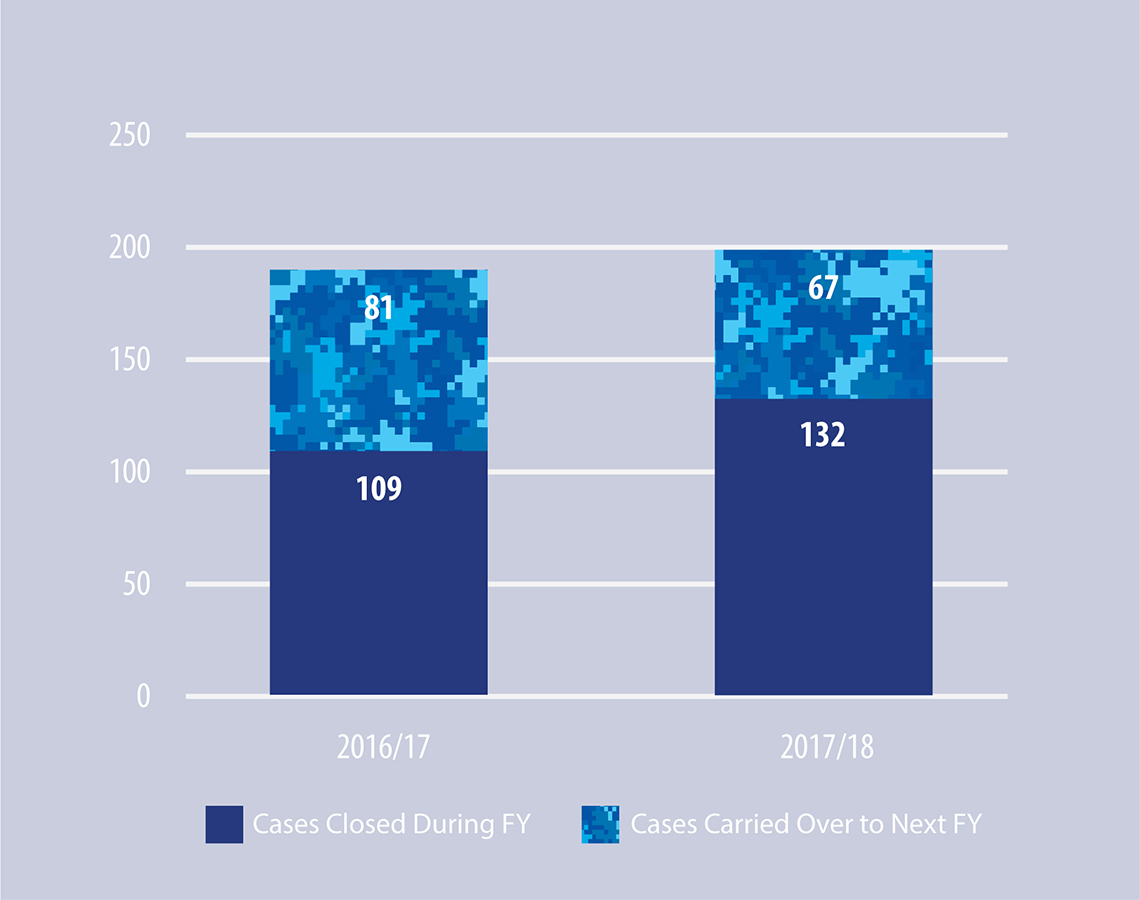
For graph breakdown, please refer to the table below:
| 2016/17 | 2017/18 | |
|---|---|---|
| Cases Carried Over to Next Fiscal Year | 81 | 67 |
| Cases Closed During Fiscal Year | 109 | 132 |
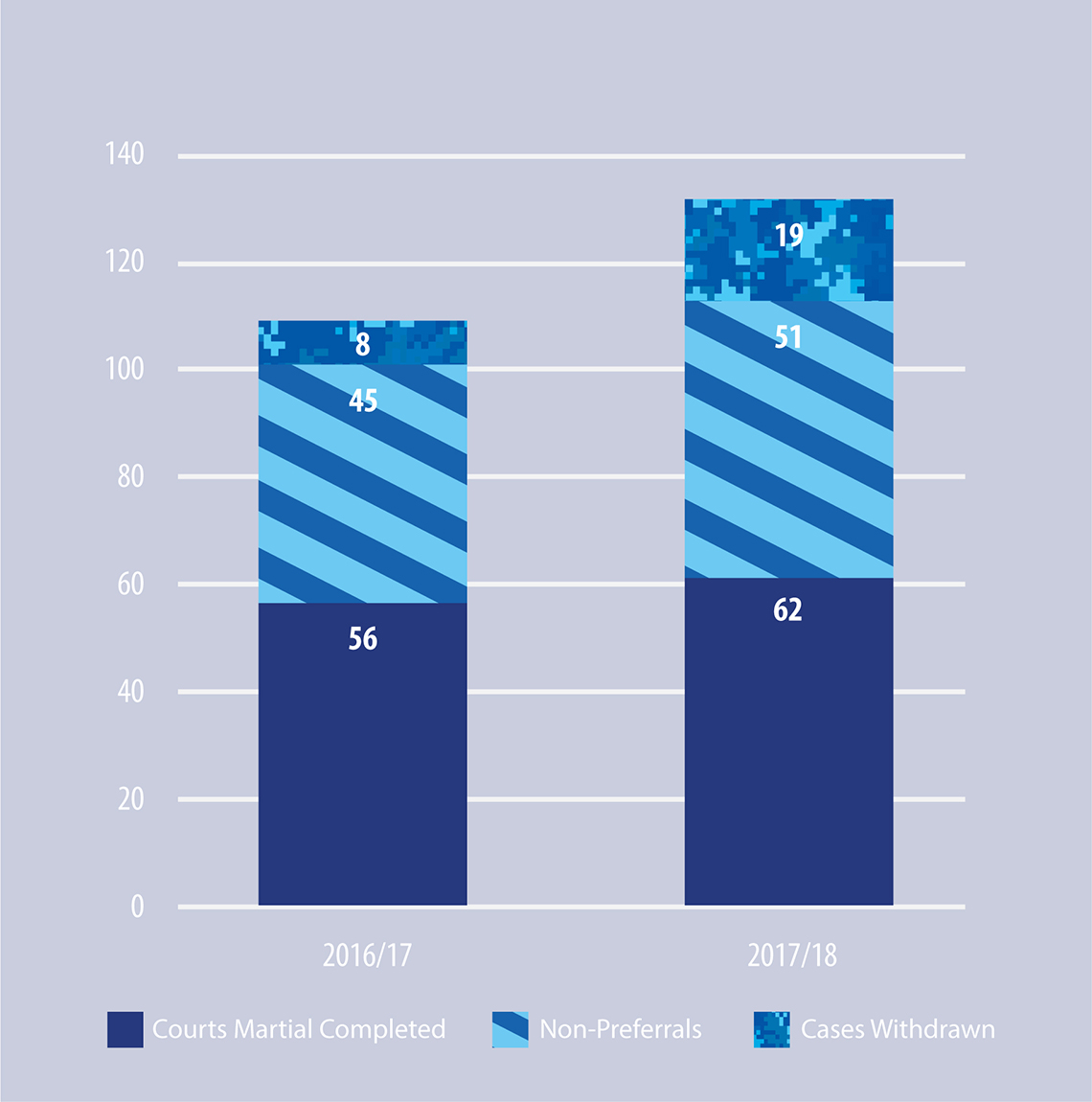
For graph breakdown, please refer to the table below:
| 2016/17 | 2017/18 | |
|---|---|---|
| Courts Martial Completed | 56 | 62 |
| Non-Preferrals | 45 | 51 |
| Charges Withdrawn | 8 | 19 |
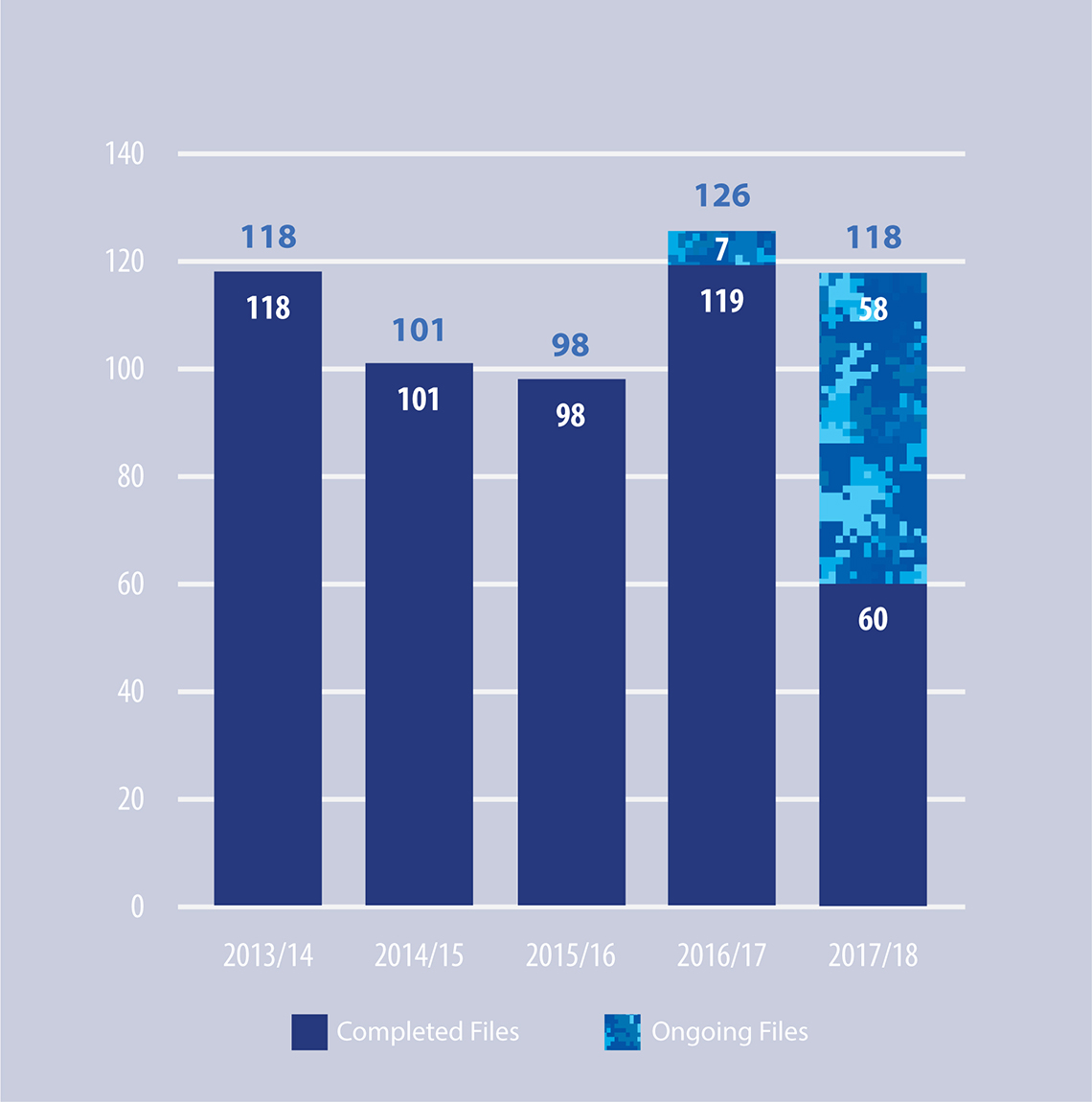
For graph breakdown, please refer to the table below:
| 2013/14 | 2014/15 | 2015/16 | 2016/17 | 2017/18 | |
|---|---|---|---|---|---|
| Completed Files | 118 | 101 | 98 | 119 | 60 |
| Ongoing Files | 0 | 0 | 0 | 7 | 58 |
| Total | 118 | 101 | 98 | 126 | 118 |
Current status of all referrals received per fiscal year for the past five years is displayed above. For referrals received in the reporting period, 60 were completed (either though a non-preferral decision, a completed court martial or withdrawal of charges), thus leaving 58 cases ongoing (pending post-charge decision, awaiting trial date or court martial convened but not completed). As of 31 March 2018, 7 cases from previous fiscal years were still outstanding (for a total of 65 cases carried over to FY 2018-2019).
During the reporting period, the investigation of the alleged offence(s) was done at the unit level for over 45% of referrals (54 out of 118 referrals). In contrast, MP investigations amounted to more than 29% of referrals compared to close to 38% in FY 2016-2017. CFNIS investigations increased by 15% from referrals received in FY 2016-2017 to 25% of all referrals received during this reporting period.
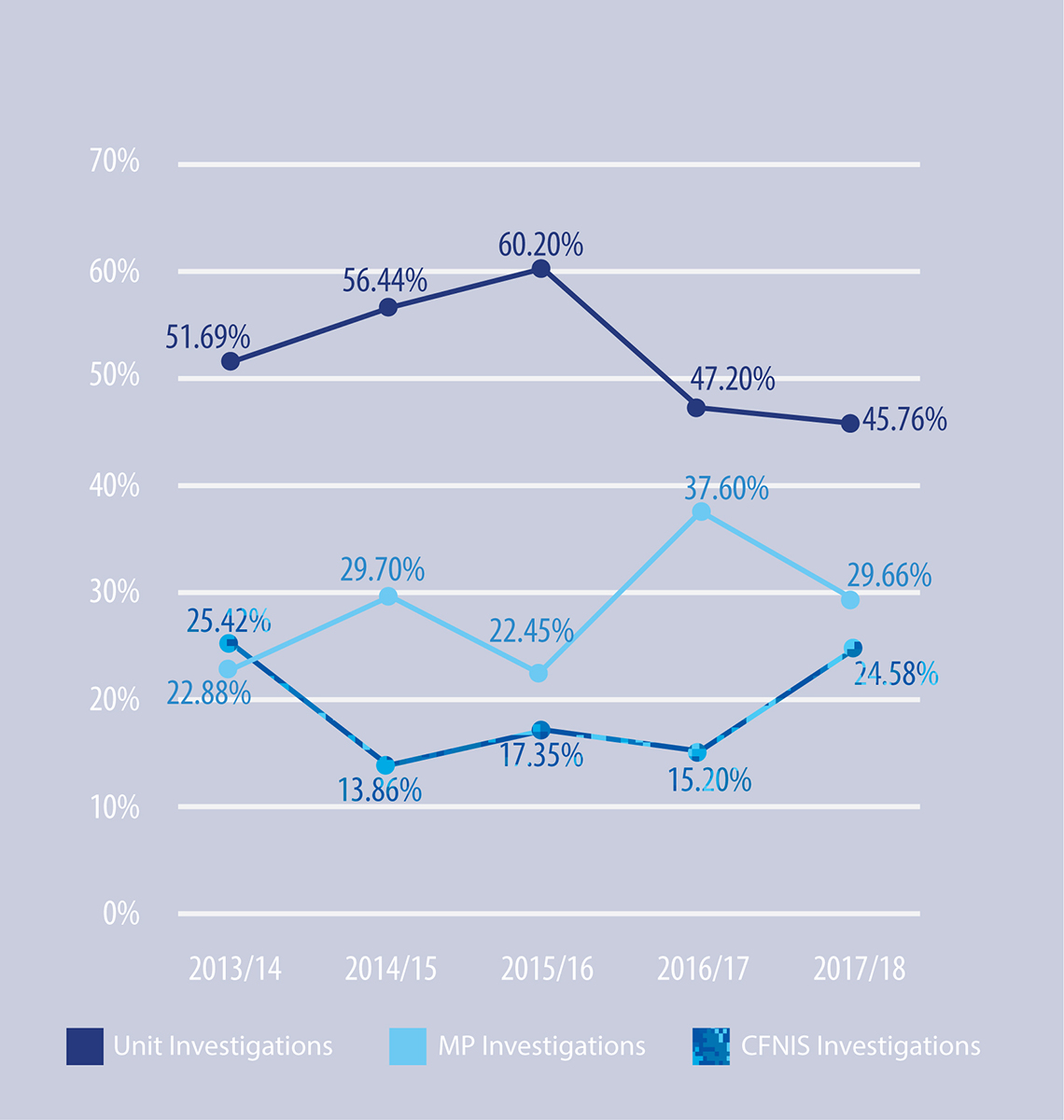
For graph breakdown, please refer to the table below:
| 2013/14 | 2014/15 | 2015/16 | 2016/17 | 2017/18 | |
|---|---|---|---|---|---|
| Unit Investigations | 51.69% | 56.44% | 60.20% | 47.62% | 45.76% |
| MP Investigations | 22.88% | 29.70% | 22.45% | 37.60% | 29.66% |
| CFNIS Investigations | 25.42% | 13.86% | 17.35% | 15.20% | 24.58% |
3.5 Post-Charge Review
The number of post-charge decisions made by CMPS during the reporting period decreased slightly compared with 2016-2017. Out of the 199 referrals handled in the reporting period, decisions were made in relation to 120 of them. As of note, 57 files carried-over from previous FYs already had charges preferred for court martial. An additional 22 files, all of them received in FY 2017-2018 were still awaiting post-charge decision as of 31 March 2018. Out of the total of 120 post-charge decisions made in the reporting period, 58% resulted in charges being preferred for court martial which is less than last year’s preferral rate of 65%.
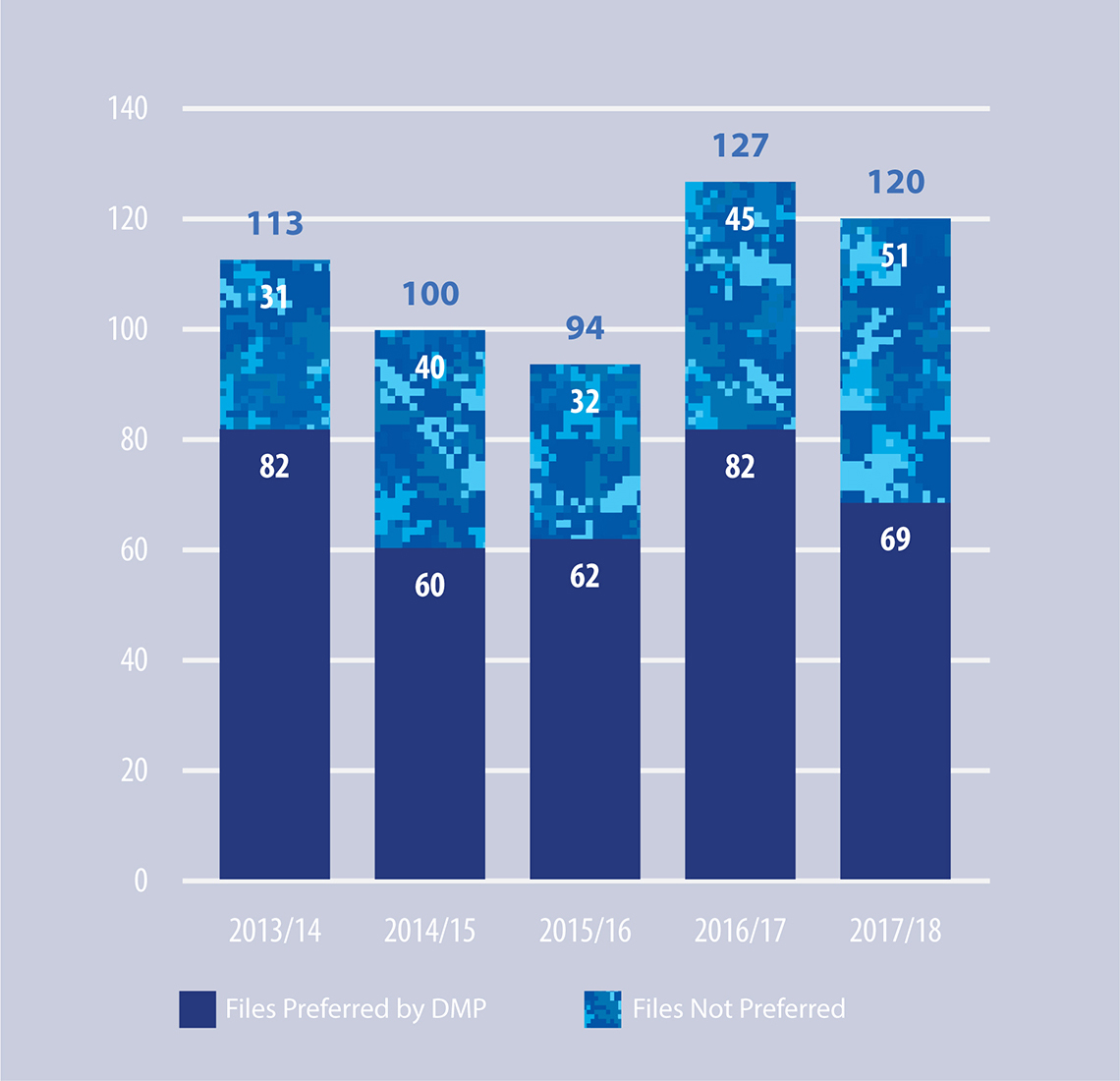
For graph breakdown, please refer to the table below:
| 2013/14 | 2014/15 | 2015/16 | 2016/17 | 2017/18 | |
|---|---|---|---|---|---|
| Files Preferred by DMP | 82 | 60 | 62 | 82 | 69 |
| Files Not Preferred | 31 | 40 | 32 | 45 | 51 |
| Total | 113 | 100 | 94 | 127 | 120 |
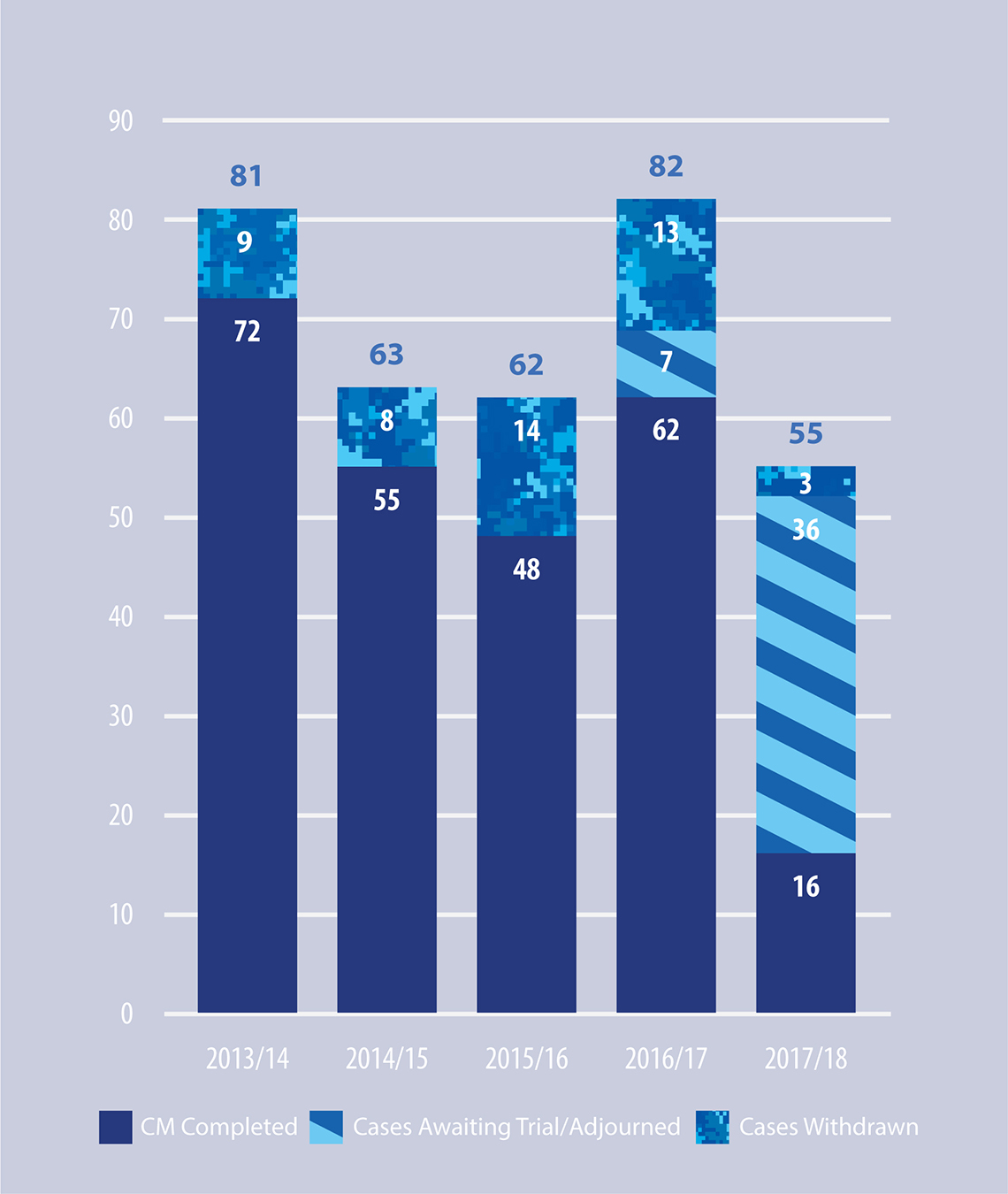
For graph breakdown, please refer to the table below:
| 2013/14 | 2014/15 | 2015/16 | 2016/17 | 2017/18 | |
|---|---|---|---|---|---|
| CM Completed | 72 | 55 | 48 | 62 | 16 |
| Case Awaiting Trial/Adjourned | 0 | 0 | 0 | 7 | 36 |
| Cases Withdrawn | 9 | 8 | 14 | 13 | 3 |
| Total | 81 | 63 | 62 | 82 | 55 |
The graph above displays the current status of referrals that were received in the corresponding fiscal year and for which charges were preferred for court martial. Out of a total of 69 files that were preferred for court martial in FY 2017-2018, 55 were preferred from referrals received during the reporting period. 19 cases were completed prior to 31 March 2018, including 16 out of the total 62 courts martial completed during the reporting period. An additional 14 referrals preferred during the reporting period were received during previous FYs.
As of 31 March 2018, there were 7 files (6 accused) from previous FYs (all from FY 2016/2017) that were preferred for court martial and still outstanding:
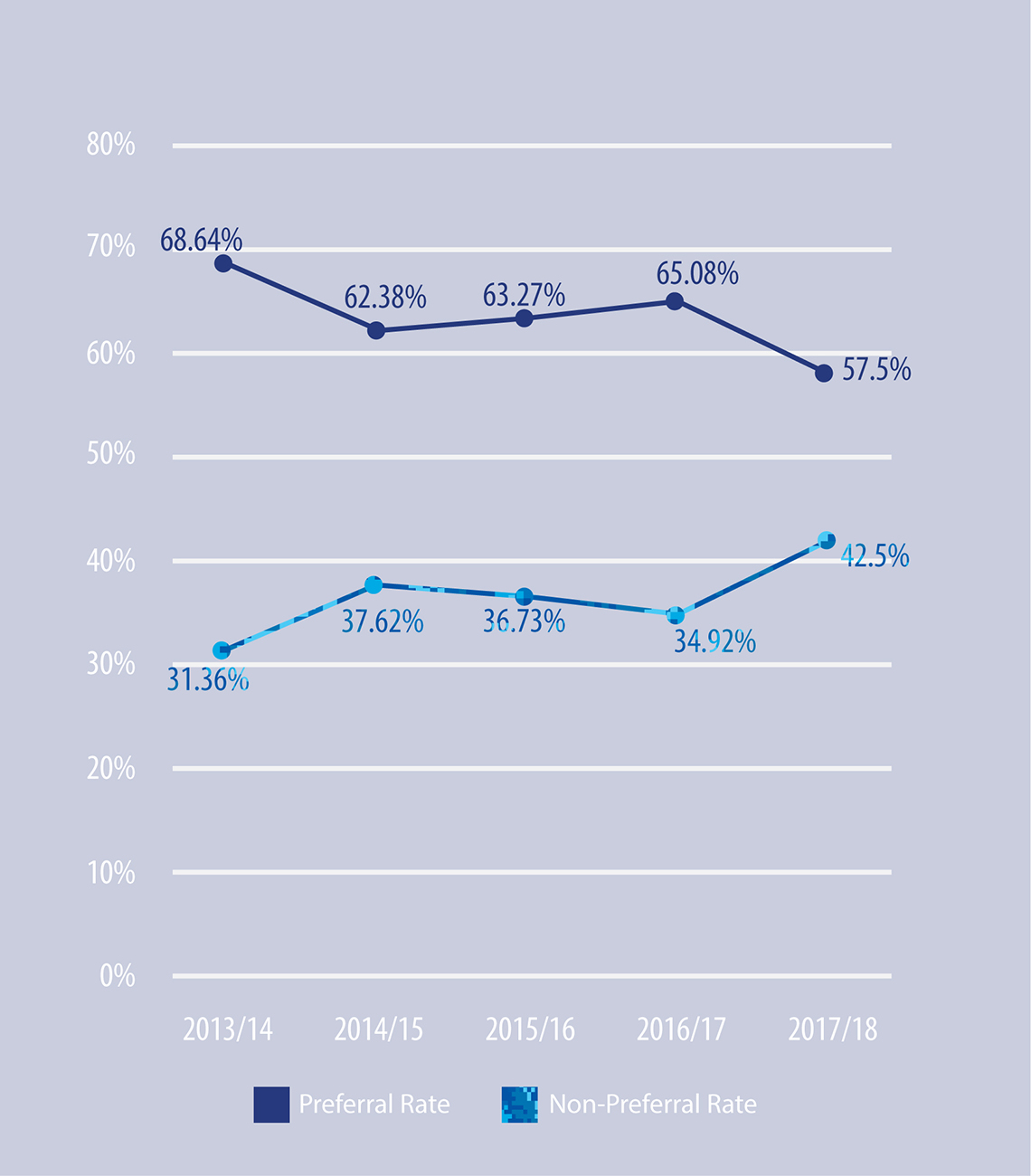
For graph breakdown, please refer to the table below:
| 2013/14 | 2014/15 | 2015/16 | 2016/17 | 2017/18 | |
|---|---|---|---|---|---|
| Preferral Rate | 68.64% | 62.38% | 63.27% | 65.08% | 57.50% |
| Non-Preferral Rate | 31.36% | 37.62% | 36.73% | 34.92% | 42.50% |
As indicated by figure 14, the preferral rate for this reporting period was at its lowest since FY 2013-2014.
The DMP has noticed a downward trend regarding the preferral rate for cases investigated at the unit level which may be indicative of a systemic issue and has proceeded to bring it to the attention of the JAG in her capacity as superintendent of military justice.
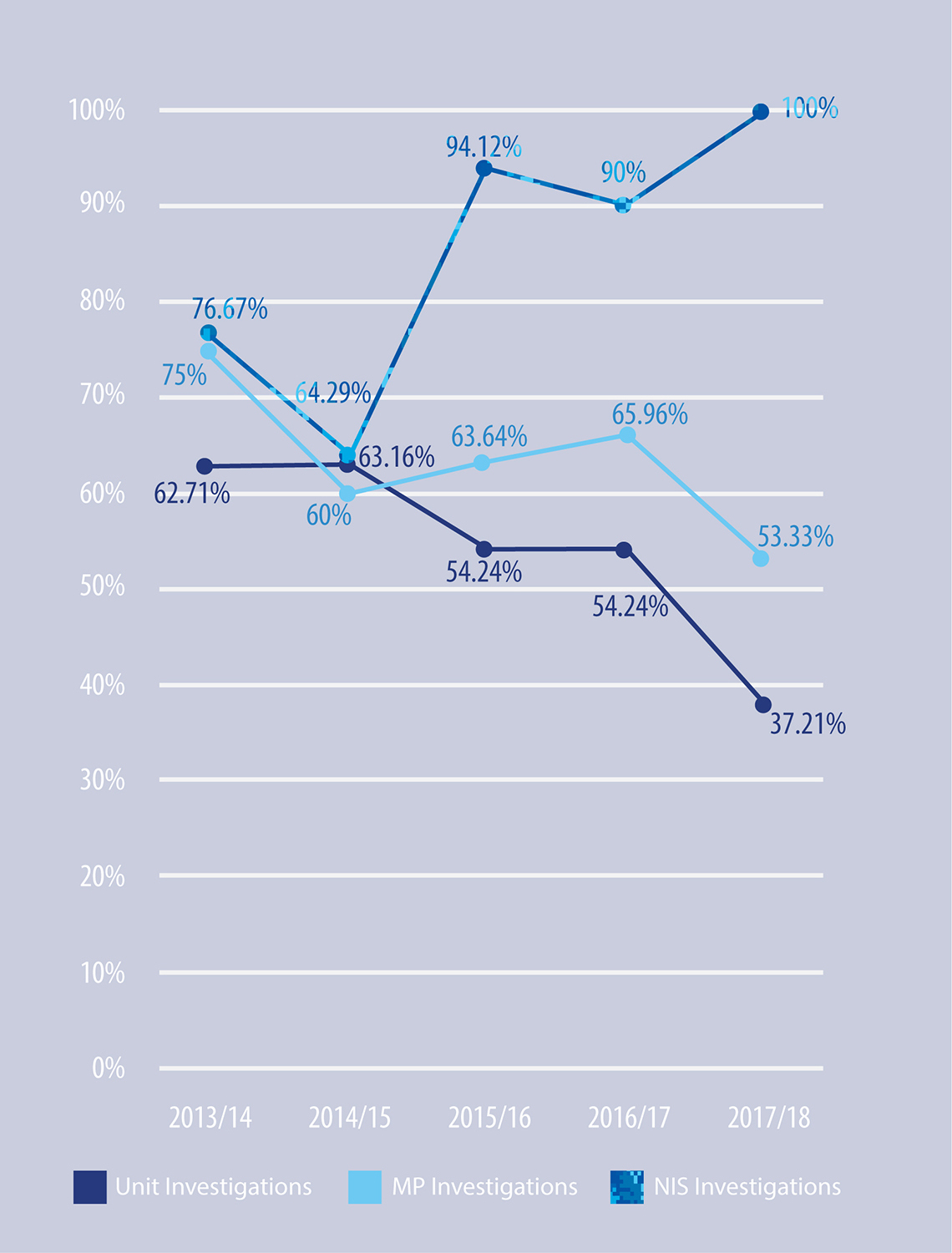
For graph breakdown, please refer to the table below:
| 2013/14 | 2014/15 | 2015/16 | 2016/17 | 2017/18 | |
|---|---|---|---|---|---|
| Unit Investigations | 62.71% | 63.16% | 54.24% | 54.24% | 37.21% |
| MP Investigations | 75% | 60.00% | 63.64% | 65.96% | 53.33% |
| CFNIS Investigations | 76.67% | 64.29% | 94.12% | 90% | 100% |
3.6 Cases Carried-Over
Of the 65 files that will be carried-over into FY 2018-2019, 43 had charges already preferred for court martial and an additional 22 were still pending as of 31 March 2018.
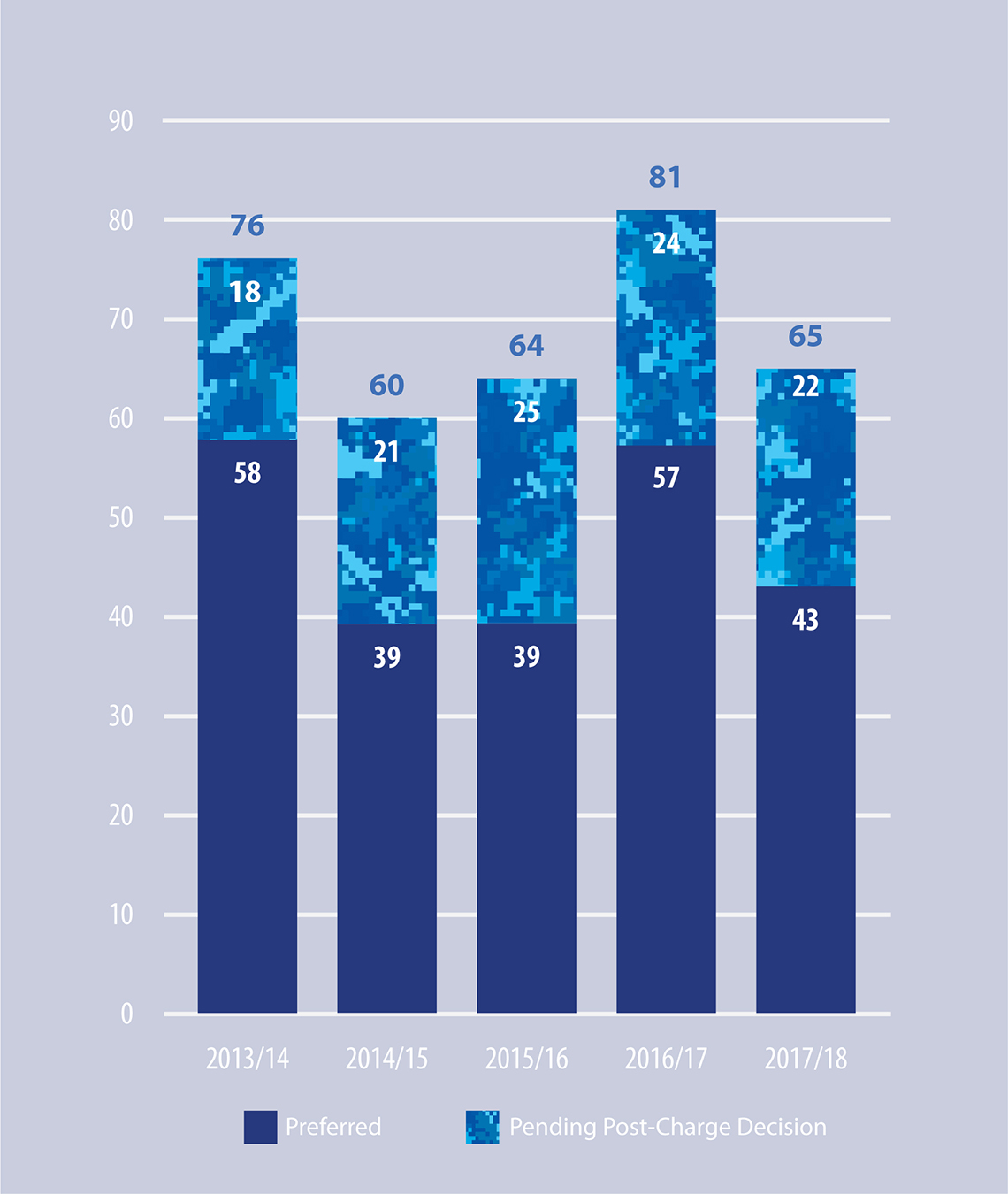
For graph breakdown, please refer to the table below:
| 2013/14 | 2014/15 | 2015/16 | 2016/17 | 2017/18 | |
|---|---|---|---|---|---|
| Preferred Cases | 58 | 39 | 39 | 57 | 43 |
| Pending Post-Charge Decision | 18 | 21 | 25 | 24 | 22 |
| Total | 76 | 60 | 64 | 81 | 65 |
3.7 Military Justice Proceedings
During the present reporting period, military prosecutors represented the Crown in several different types of judicial proceedings related to the military justice system. These proceedings included pre-trial custody hearings, courts martial, and appeals from courts martial to the CMAC and SCC.19
3.7.1 Custody Review Hearings
Military judges are, in certain circumstances, required to review orders made to retain a CAF member in service custody. The DMP represents the CAF at such hearings. During the reporting period, military prosecutors appeared at five pre-trial custody review hearings20. There were no 90-day review hearings21 and no release pending appeal revocation hearings.22
Further information on custody reviews is provided at Annex G.
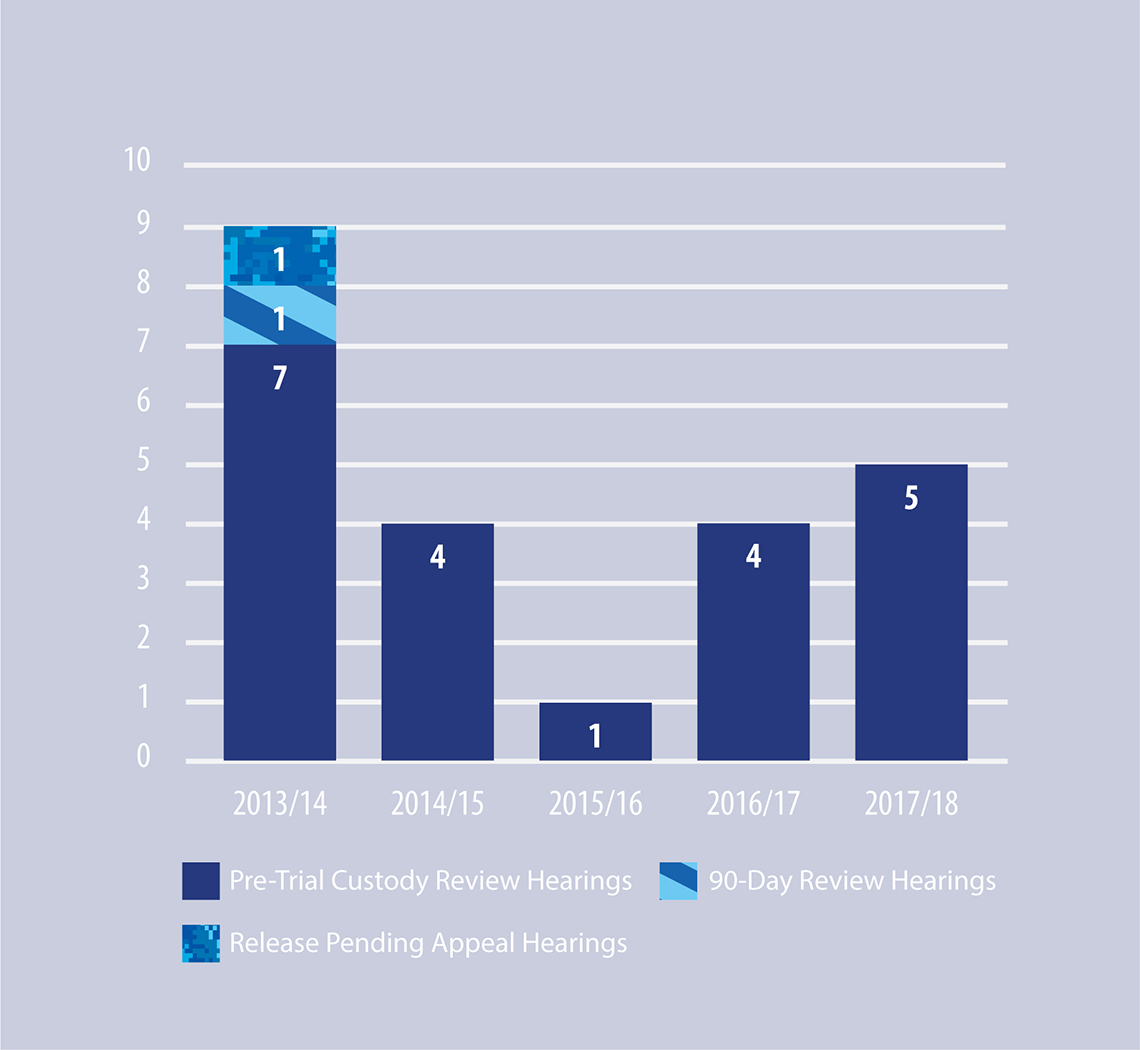
For graph breakdown, please refer to the table below:
| 2013/14 | 2014/15 | 2015/16 | 2016/17 | 2017/18 | |
|---|---|---|---|---|---|
| Pre-Trial Custody Review Hearings | 7 | 4 | 1 | 4 | 5 |
| 90-Day Review Hearings | 1 | 0 | 0 | 0 | 0 |
| Release Pending Appeal Revocation Hearings | 1 | 0 | 0 | 0 | 0 |
3.7.2 Court Martial Proceedings
During the reporting period, 62 courts martial were completed. The majority of these are SCMs presided by a military judge alone. Only five GCMs were held before a panel of five military members acting as trier of facts.
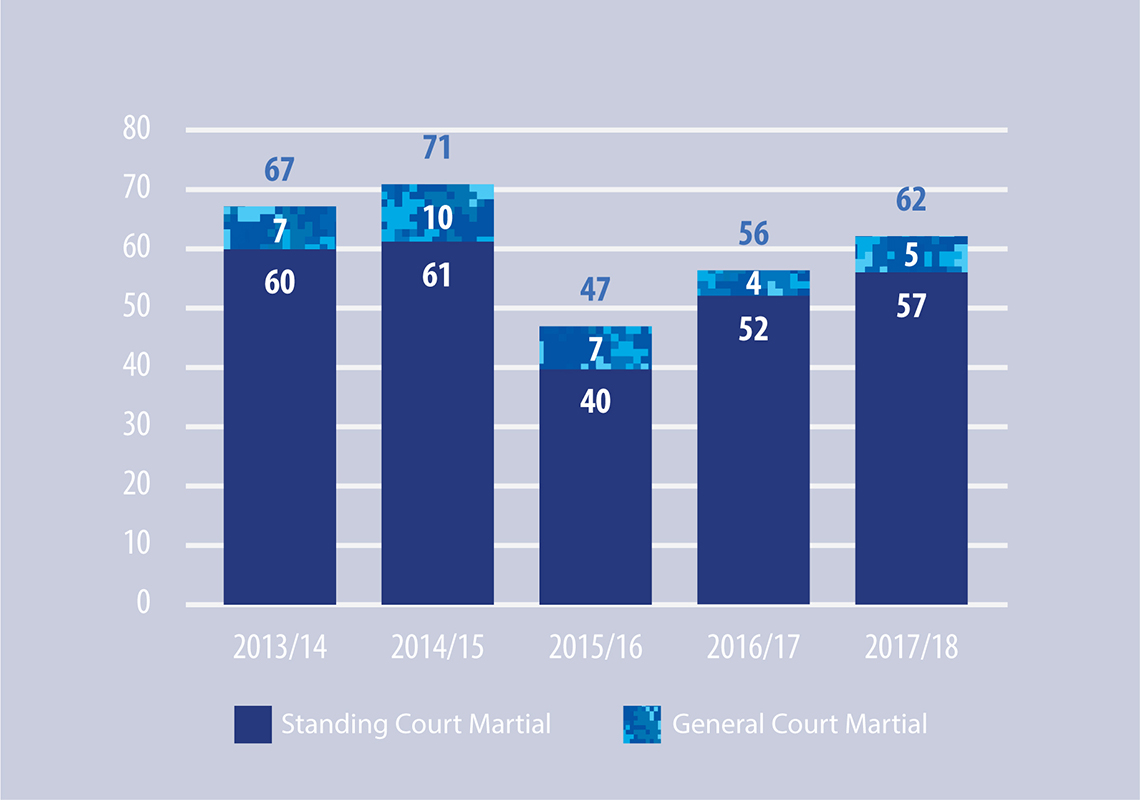
For graph breakdown, please refer to the table below:
| 2013/14 | 2014/15 | 2015/16 | 2016/17 | 2017/18 | |
|---|---|---|---|---|---|
| Standing Court Martial | 60 | 61 | 40 | 52 | 57 |
| General Court Martial | 7 | 10 | 7 | 4 | 5 |
| Total | 67 | 71 | 47 | 56 | 62 |
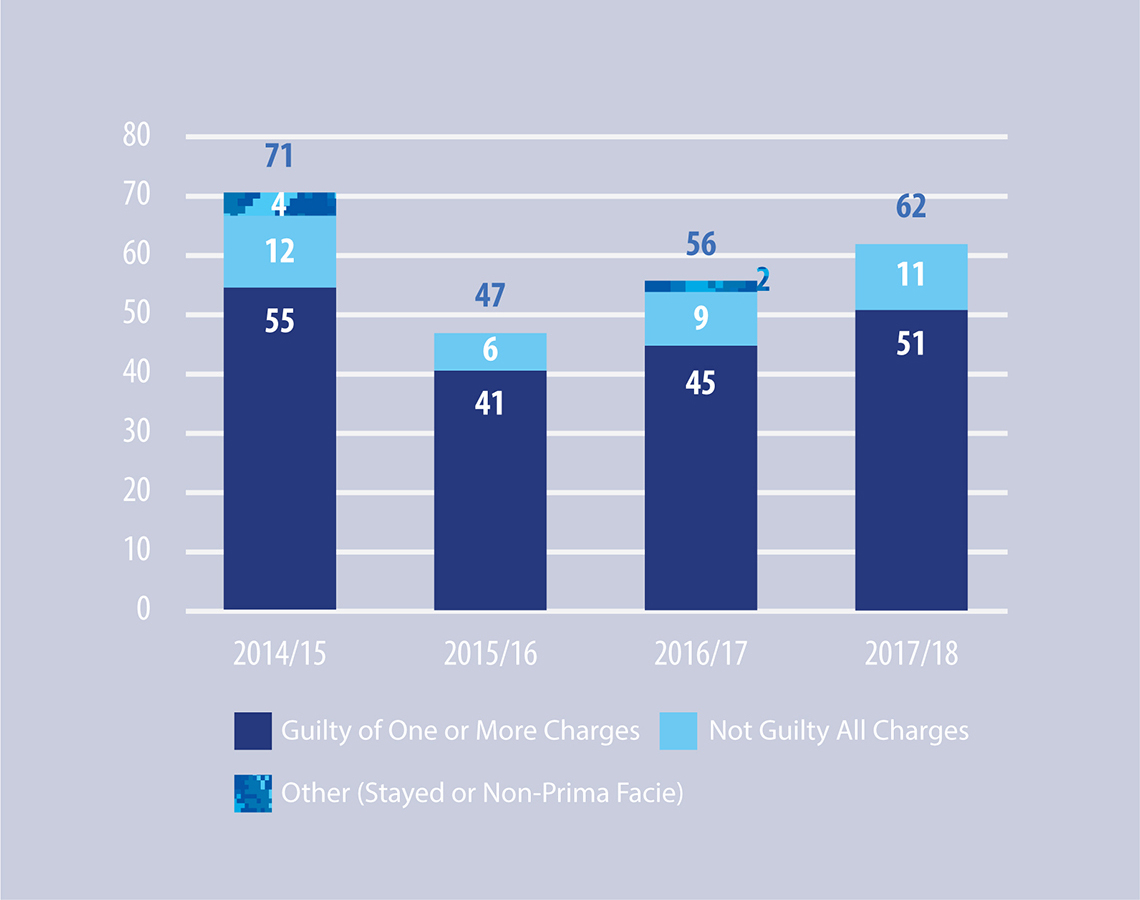
For graph breakdown, please refer to the table below:
| 2014/15 | 2015/16 | 2016/17 | 2017/18 | |
|---|---|---|---|---|
| Guilty of One or More Charges | 55 | 41 | 45 | 51 |
| Not Guilty All Charges | 12 | 6 | 9 | 11 |
| Other (Stayed or Non-Prima Facie) | 4 | 0 | 2 | 0 |
| TOTAL | 71 | 47 | 56 | 62 |
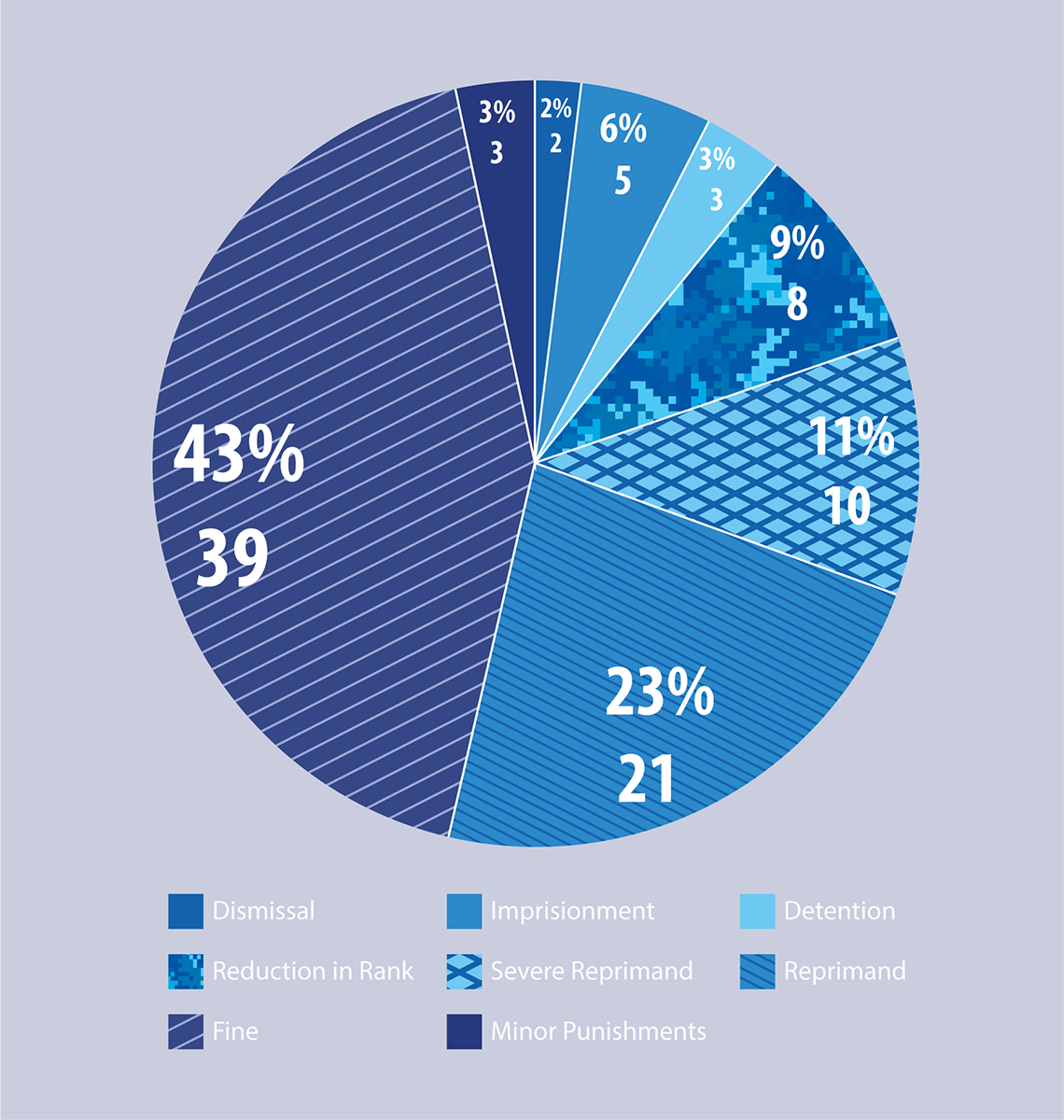
For graph breakdown, please refer to the table below:
| Number | Percentage | |
|---|---|---|
| Fine | 39 | 43% |
| Reprimand | 21 | 23% |
| Severe Reprimand | 10 | 11% |
| Reduction in Rank | 8 | 9% |
| Imprisionment | 5 | 6% |
| Detention | 3 | 3% |
| Minor Punishments | 3 | 3% |
| Dismissal | 2 | 2% |
Sentences imposed at courts martial for service offences range from imprisonment for life to minor punishments which are prescribed by the QR&Os23. During the reporting period, 43% of punishments consisted in a fine and there were only two dismissals.
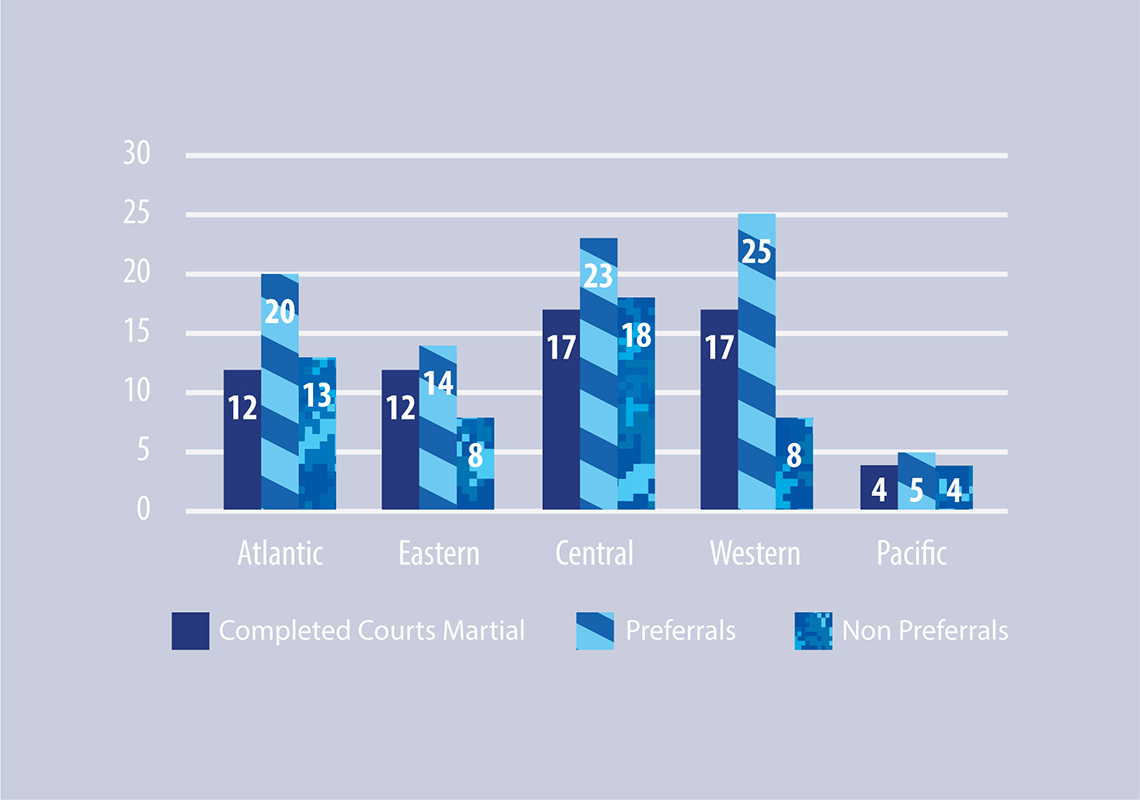
For graph breakdown, please refer to the table below:
| Atlantic | Eastern | Central | Western | Pacific | |
|---|---|---|---|---|---|
| Completed Courts Martial | 12 | 12 | 17 | 17 | 4 |
| Preferrals | 20 | 14 | 23 | 25 | 5 |
| Non Preferrals | 13 | 8 | 18 | 8 | 4 |
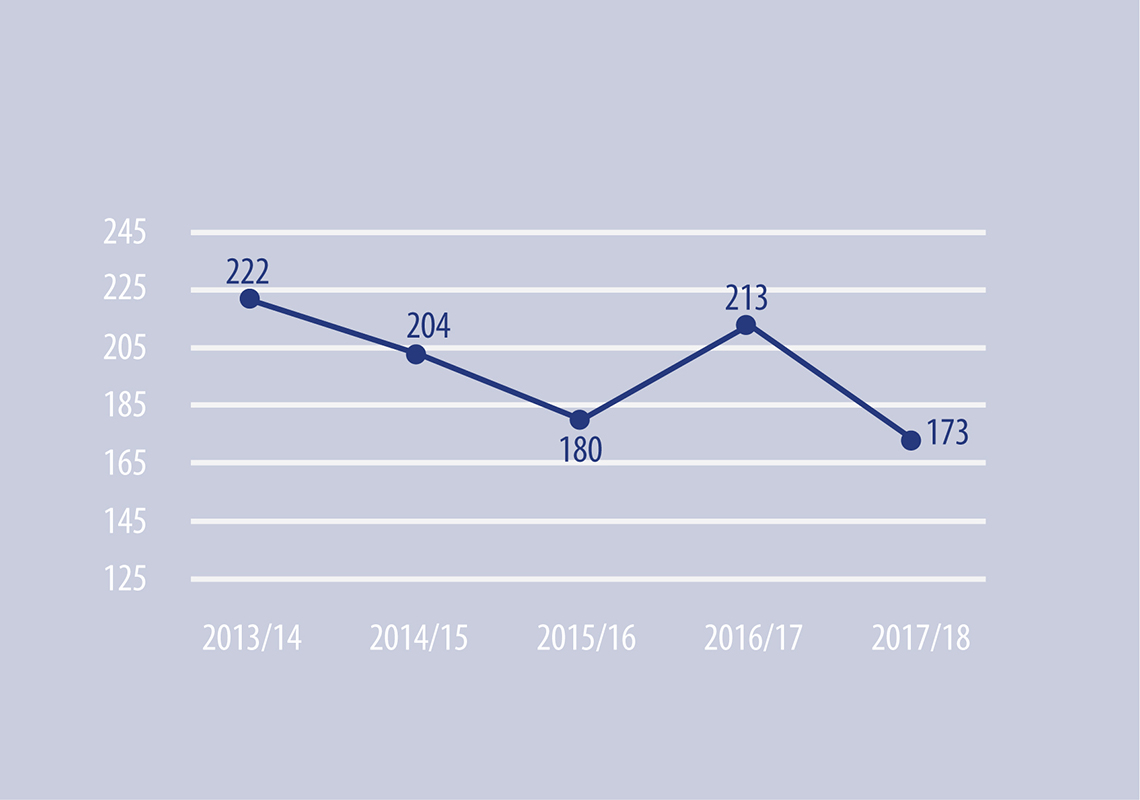
For graph breakdown, please refer to the table below:
| 2013/14 | 2014/15 | 2015/16 | 2016/17 | 2017/18 | |
|---|---|---|---|---|---|
| Court Martial Sitting Days | 222 | 204 | 180 | 213 | 173 |
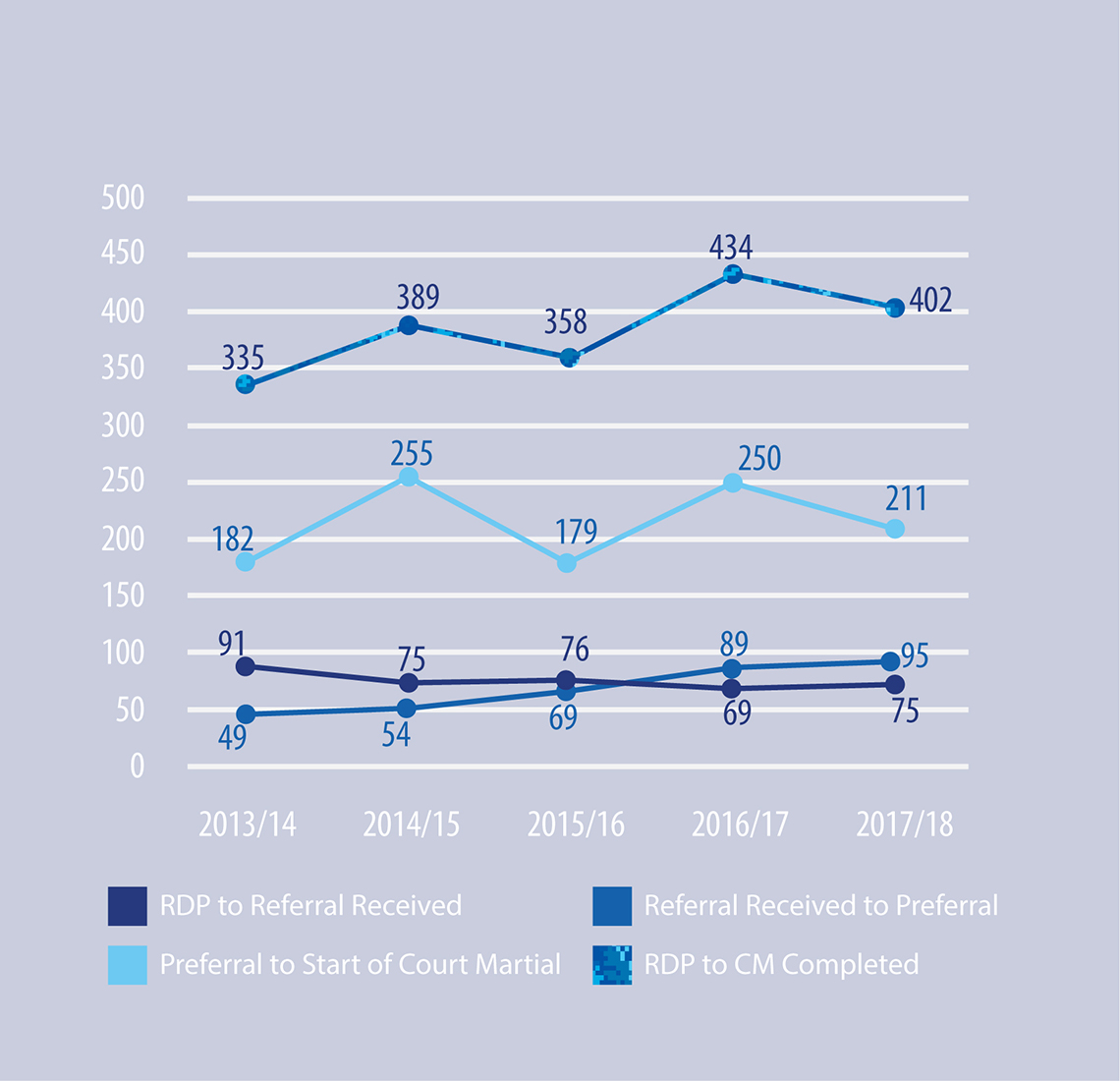
For graph breakdown, please refer to the table below:
| 2013/14 | 2014/15 | 2015/16 | 2016/17 | 2017/18 | |
|---|---|---|---|---|---|
| RDP to Referral Received | 91 | 75 | 76 | 69 | 75 |
| Referral Received to Preferral | 49 | 54 | 69 | 89 | 95 |
| Preferral to Start of Court Martial | 182 | 255 | 179 | 250 | 211 |
| RDP to CM Completed | 335 | 389 | 358 | 434 | 402 |
Courts martial sat for 173 days during the reporting period, for an average of 2.79 days per trial.
For the 62 courts martial that were completed during the reporting period, the average number of calendar days from the date of the record of disciplinary proceedings (RDP) to completion of the court martial was 402 days, 7% faster than in FY 2016-2017, thus bringing the five-year average to 384 days.
The time required to prefer charges increased from 89 days in 2016-2017 to 95 days in 2017-2018.
Cases Over 18 Months as of 31 March 2018
Following the SCC decision in the case of R v Jordan,24 the court martial in the case of R v Leading Seaman Thiele25 ruled that a court martial should be completed within 18 months from the laying of the charge on the RDP. As of 31 March 2018, the only case currently over the 18-month ceiling is the following:
| Table 3 | |
|---|---|
| Case | 18 Months reached on |
| Capt Nordstrom | 19 January 2018. Trial in this case is set to commence on 8 June 2018 |
3.8 Special Interest Offences Categories
CMPS counsel prosecute offences found in the CSD, including offences under section 130 of the NDA, which incorporate by reference federal offences such as offences found in the Criminal Code and in the Controlled Drugs and Substances Act (CDSA).26
A selection of courts martial in the following four broad areas is highlighted below:
- Military Conduct Offences (unique military offence such as disobedience of lawful command, insubordination, absence without leave, drunkenness desertion, etc.
- Sexual Misconduct Offences;
- Fraud and Other Offences Against Property; and
- Drug Offences
Additionally, a list of charges preferred under sections 129 and 130 of the NDA for courts martial held during the reporting period may be found at the end of this section.
The cases discussed below are a sampling of those dealt with by courts martial during the reporting period. These cases give a sense of the offenders and offences that were prosecuted, as well as the sentences that were pronounced.
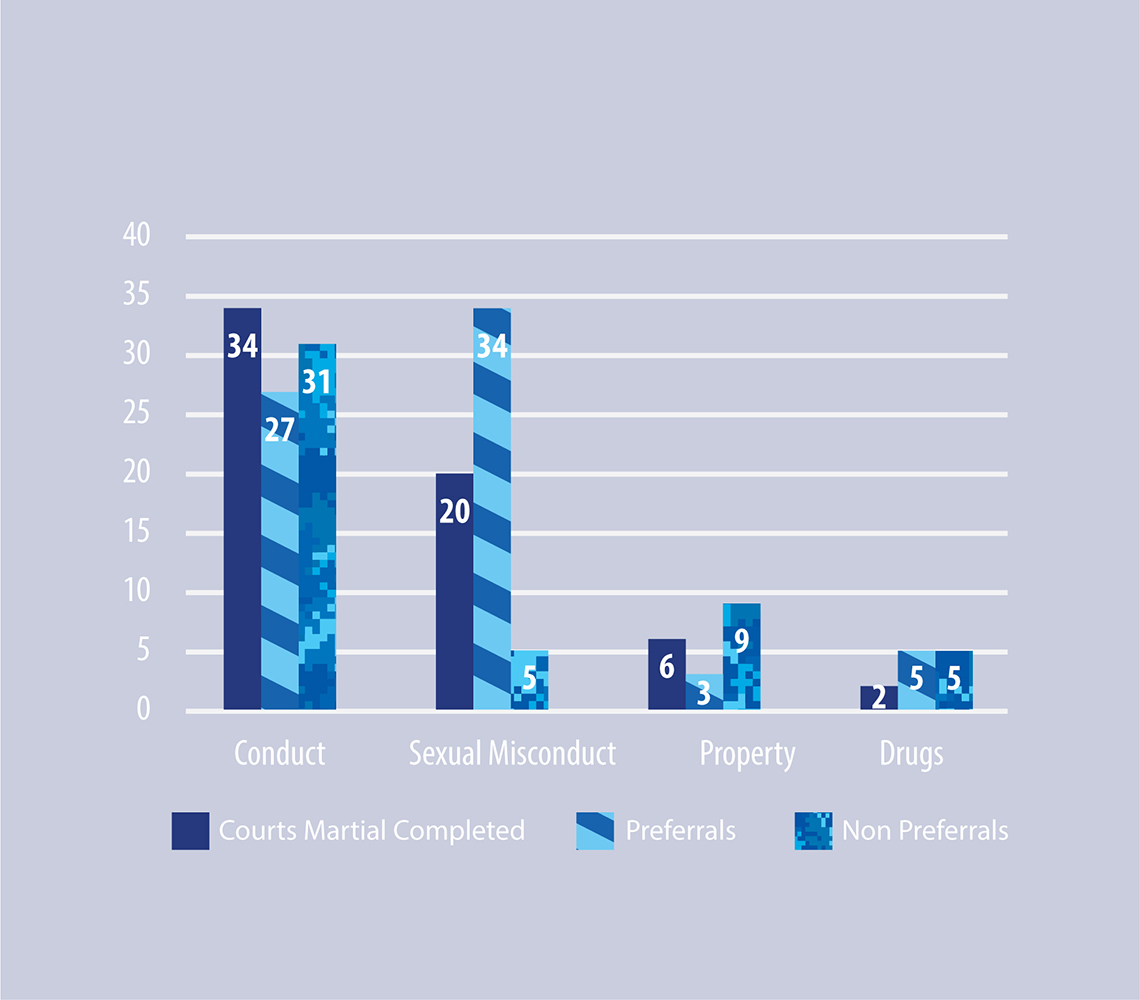
For graph breakdown, please refer to the table below:
| Conduct | Sexual Misconduct | Property | Drugs | |
|---|---|---|---|---|
| Courts Martial Completed | 34 | 20 | 6 | 2 |
| Preferrals | 27 | 34 | 3 | 5 |
| Non-Preferrals | 31 | 5 | 9 | 5 |
3.8.1 Sexual Misconduct Offences
For this section, the term sexual misconduct offence include a broad range of offences and is not limited to a sexual assault charge contrary to section 271 of the Criminal Code.
The NDA provides military prosecutors with a number of offences such as disgraceful conduct, abuse of a subordinate, sexual harassment etc. to deal with sexual misconduct in an appropriate manner. These are options open to the military prosecutor depending on the facts and the level of gravity of each case. These offences are not available in the civilian justice system. For example, under the CSD a prosecution for sexual harassment is a possibility which is not available under the civilian criminal justice system.
Figure 25 shows sexual misconduct offences in the military justice system over the past six fiscal years as a percentage of total referrals received, preferrals and courts martial completed.
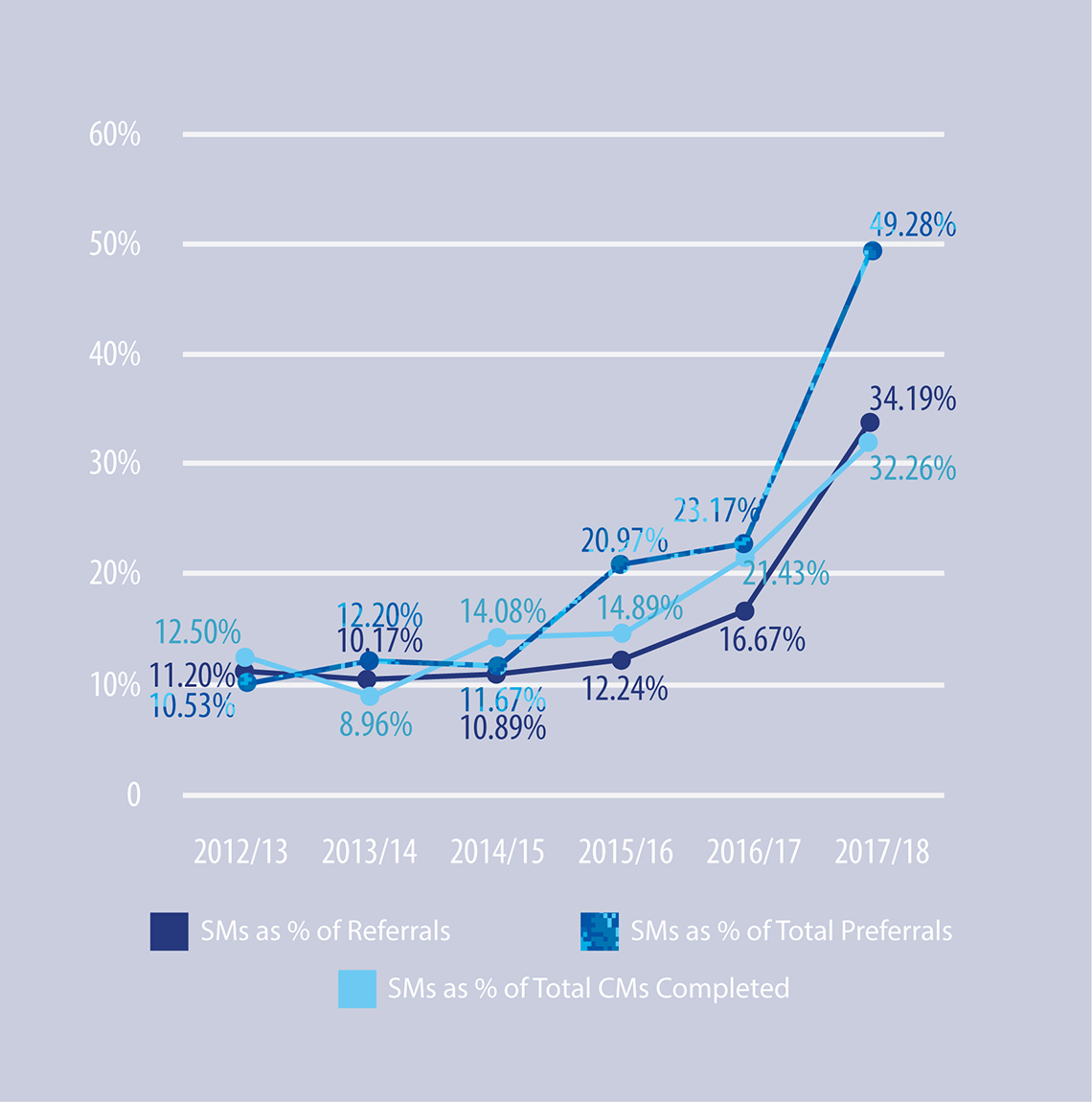
For graph breakdown, please refer to the table below:
| 2012/13 | 2013/14 | 2014/15 | 2015/16 | 2016/17 | 2017/18 | |
|---|---|---|---|---|---|---|
| SMs as % of Referrals | 11.20% | 10.17% | 10.89% | 12.24% | 16.67% | 34.19% |
| SMs as % of Total Preferrals | 10.53% | 12.20% | 11.67% | 20.97% | 23.17% | 49.28% |
| SMs as % of Total CMs Completed | 12.50% | 8.96% | 14.08% | 14.89% | 21.43% | 32.26% |
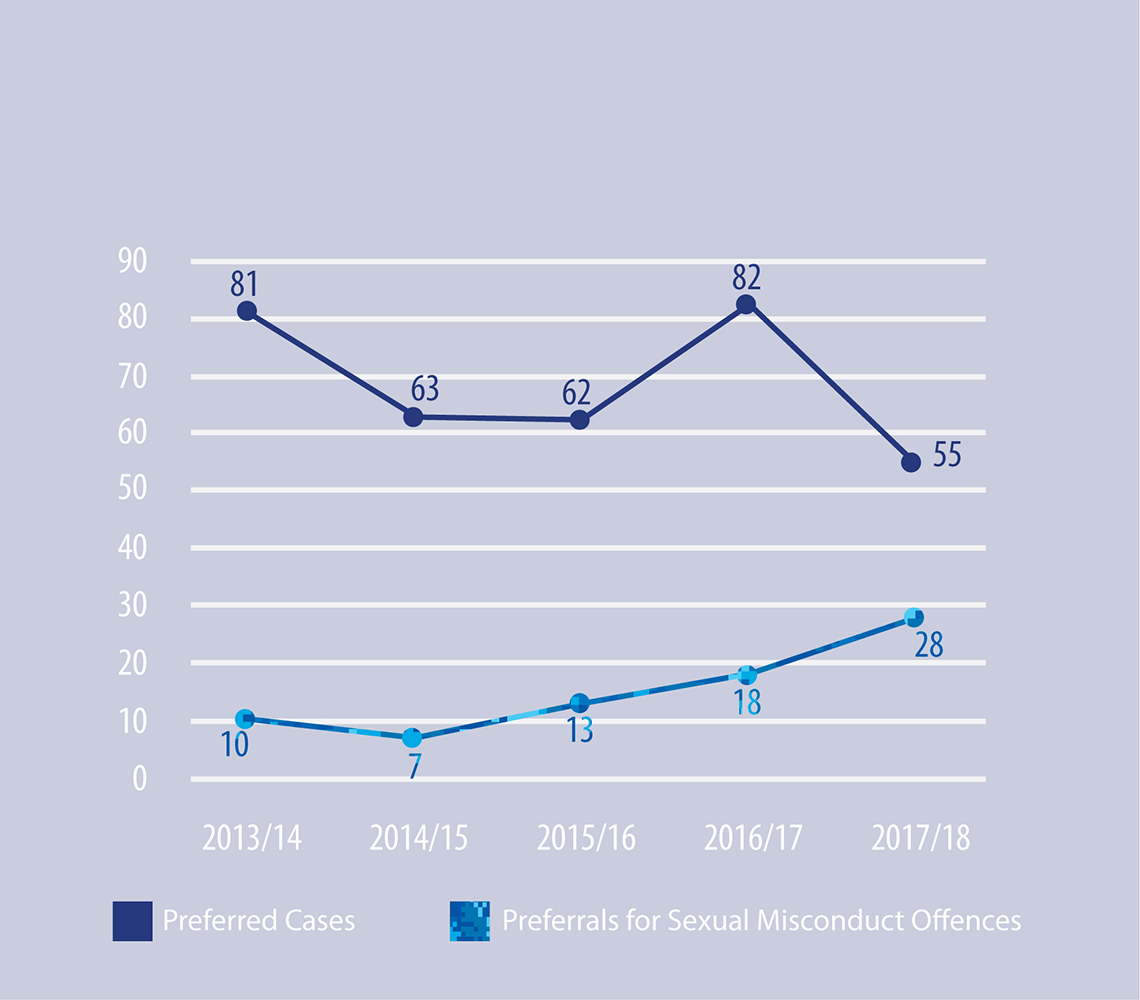
For graph breakdown, please refer to the table below:
| 2013/14 | 2014/15 | 2015/16 | 2016/17 | 2017/18 | |
|---|---|---|---|---|---|
| Preferred Cases | 81 | 63 | 62 | 82 | 55 |
| Preferrals for Sexual Misconduct Offences | 10 | 7 | 13 | 18 | 28 |
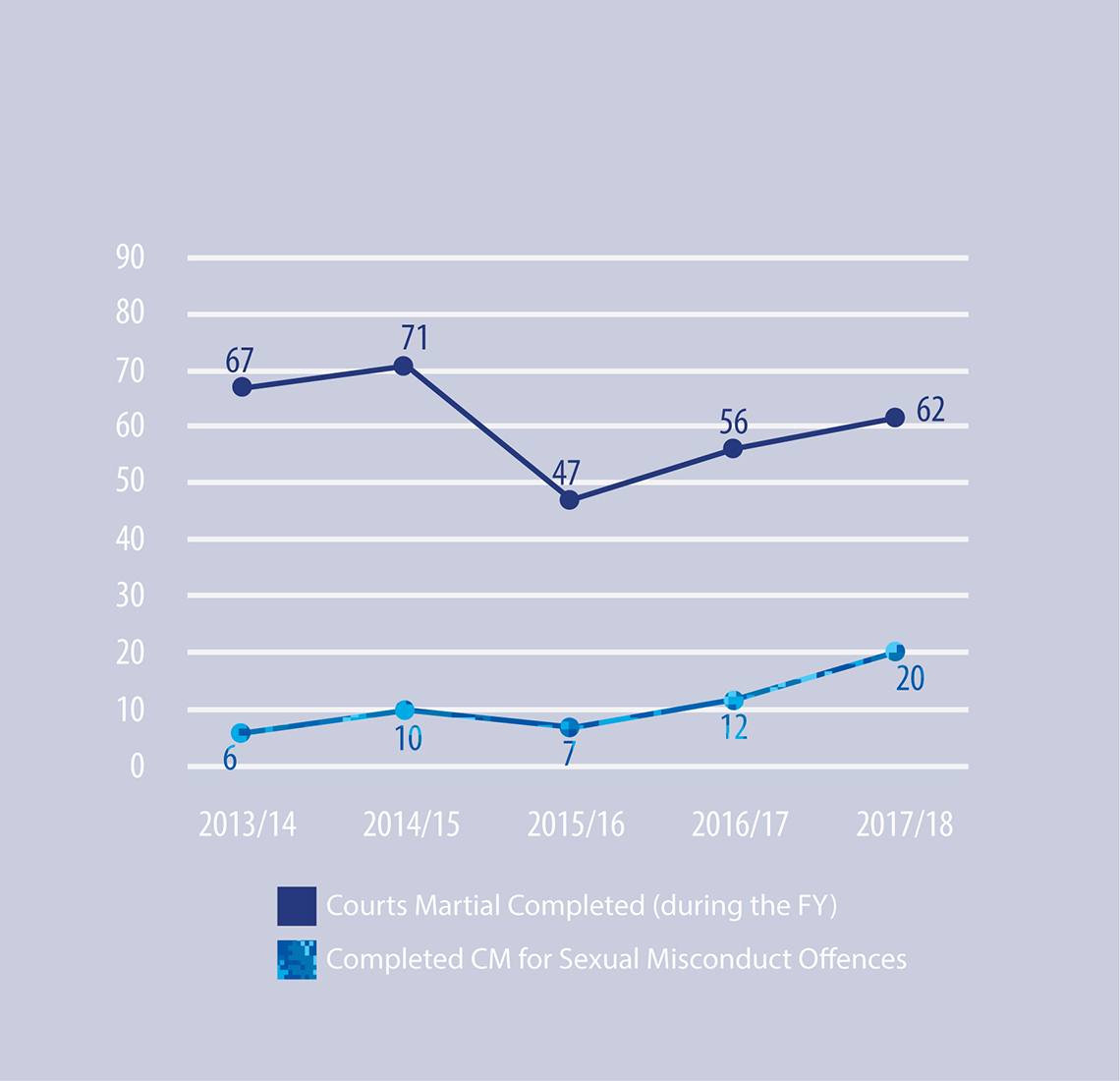
For graph breakdown, please refer to the table below:
| 2013/14 | 2014/15 | 2015/16 | 2016/17 | 2017/18 | |
|---|---|---|---|---|---|
| Courts Martial Completed (during the FY) | 67 | 71 | 47 | 56 | 62 |
| Completed CM for Sexual Misconducts Offences | 6 | 10 | 7 | 12 | 20 |
For this reporting period (as of 31 March 2018), here is a summary regarding sexual misconduct offences:
- 40 Referrals for sexual misconduct offences were received
- 28 files (from referrals received during FY) have been preferred for CM (80% of the files for which we have a decision)
- 7 were non-prefs (19% of files with decision)
- 5 are currently pending decision
- 20 courts martial were completed for SMs
- 11 x guilty pleas and guilty verdicts (55%)
- 3 x non guilty pleas and guilty verdicts (15%)
- 1 x non guilty plea and guilty of lesser and included offence (5%)
- 5 x non guilty verdicts (25%)
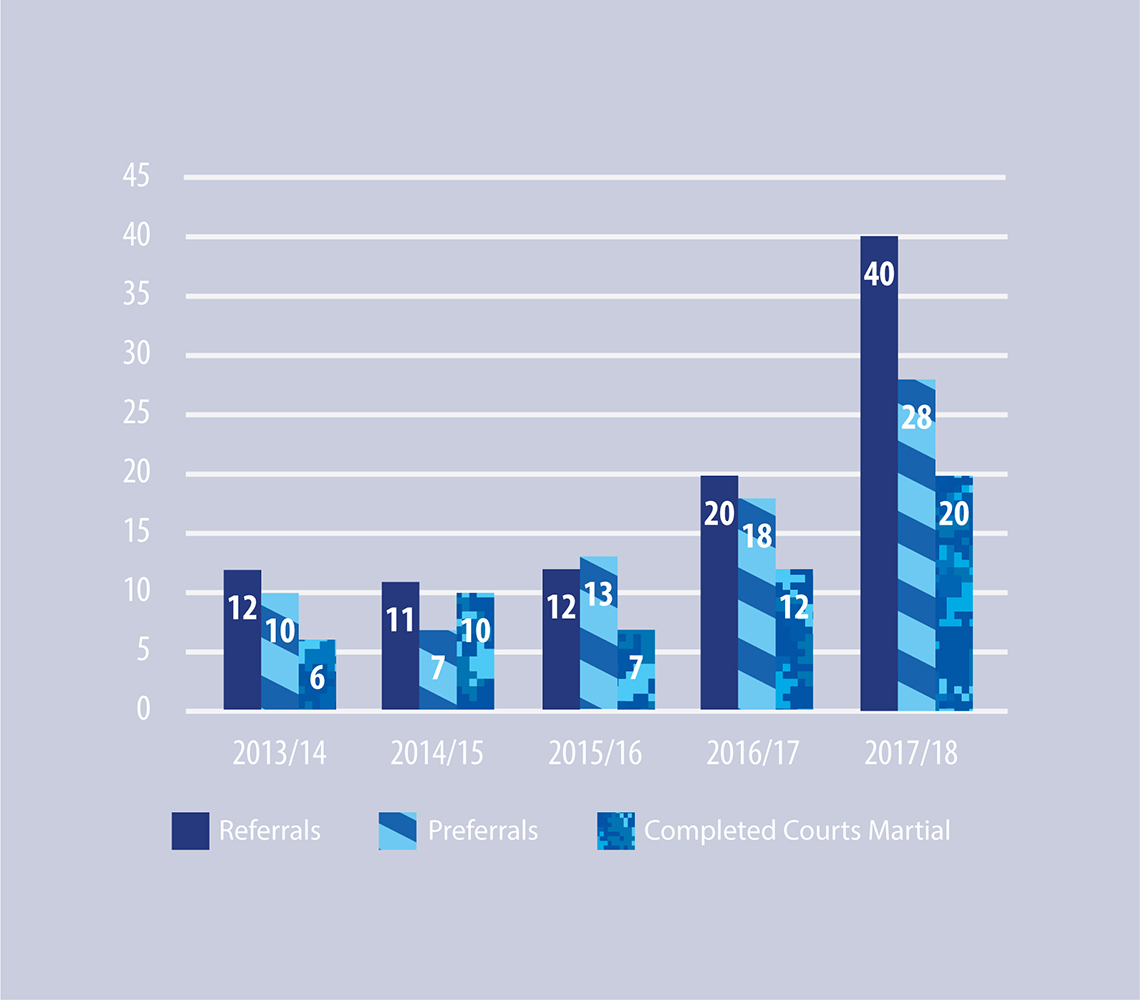
For graph breakdown, please refer to the table below:
| 2013/14 | 2014/15 | 2015/16 | 2016/17 | 2017/18 | |
|---|---|---|---|---|---|
| Referrals | 12 | 11 | 12 | 20 | 40 |
| Preferrals | 10 | 7 | 13 | 18 | 28 |
| Completed Courts Martial | 6 | 10 | 7 | 12 | 20 |
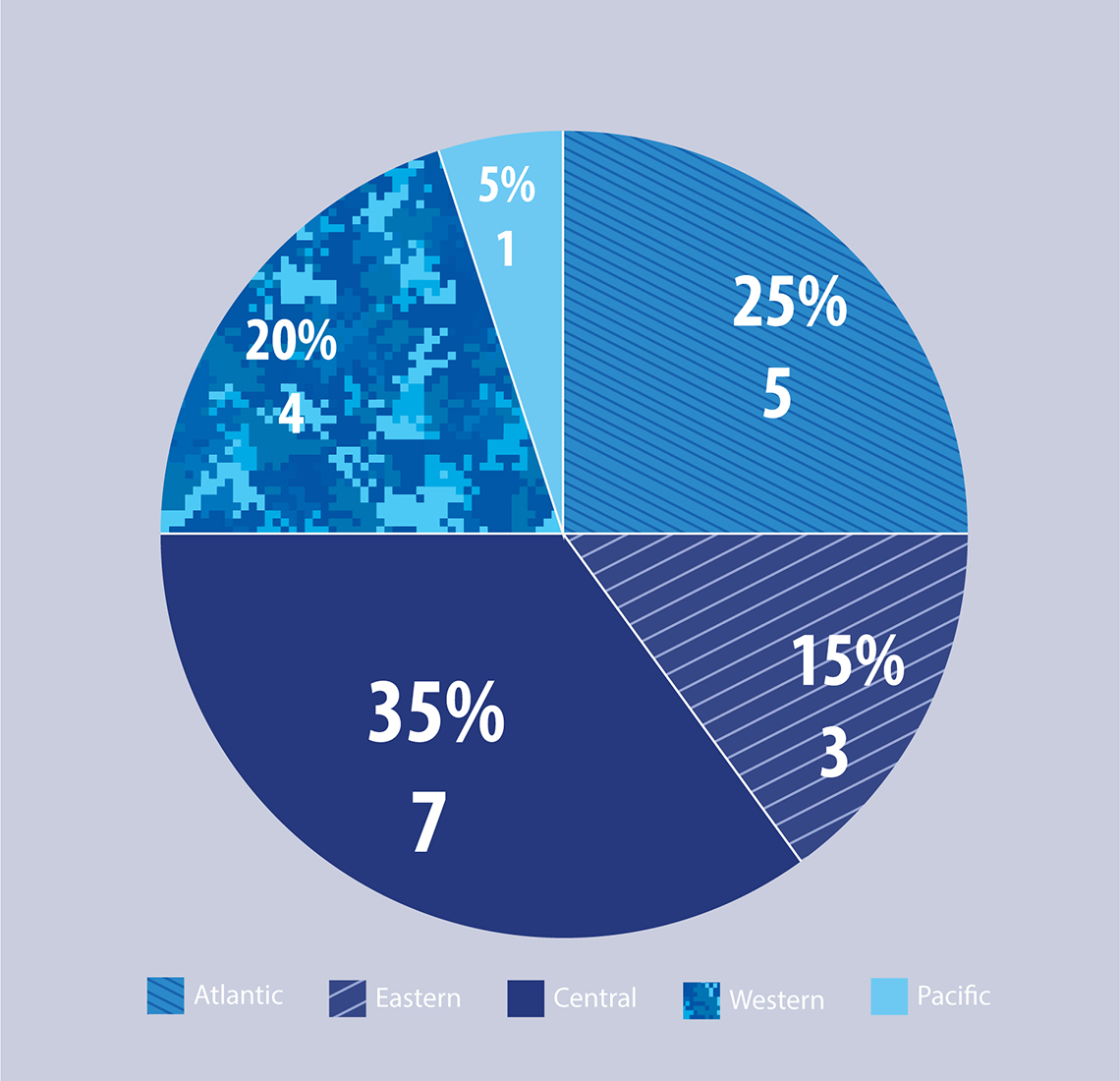
For graph breakdown, please refer to the table below:
| Number | Percentage | |
|---|---|---|
| Atlantic | 5 | 25% |
| Eastern | 3 | 15% |
| Central | 7 | 35% |
| Western | 4 | 20% |
| Pacific | 1 | 5% |
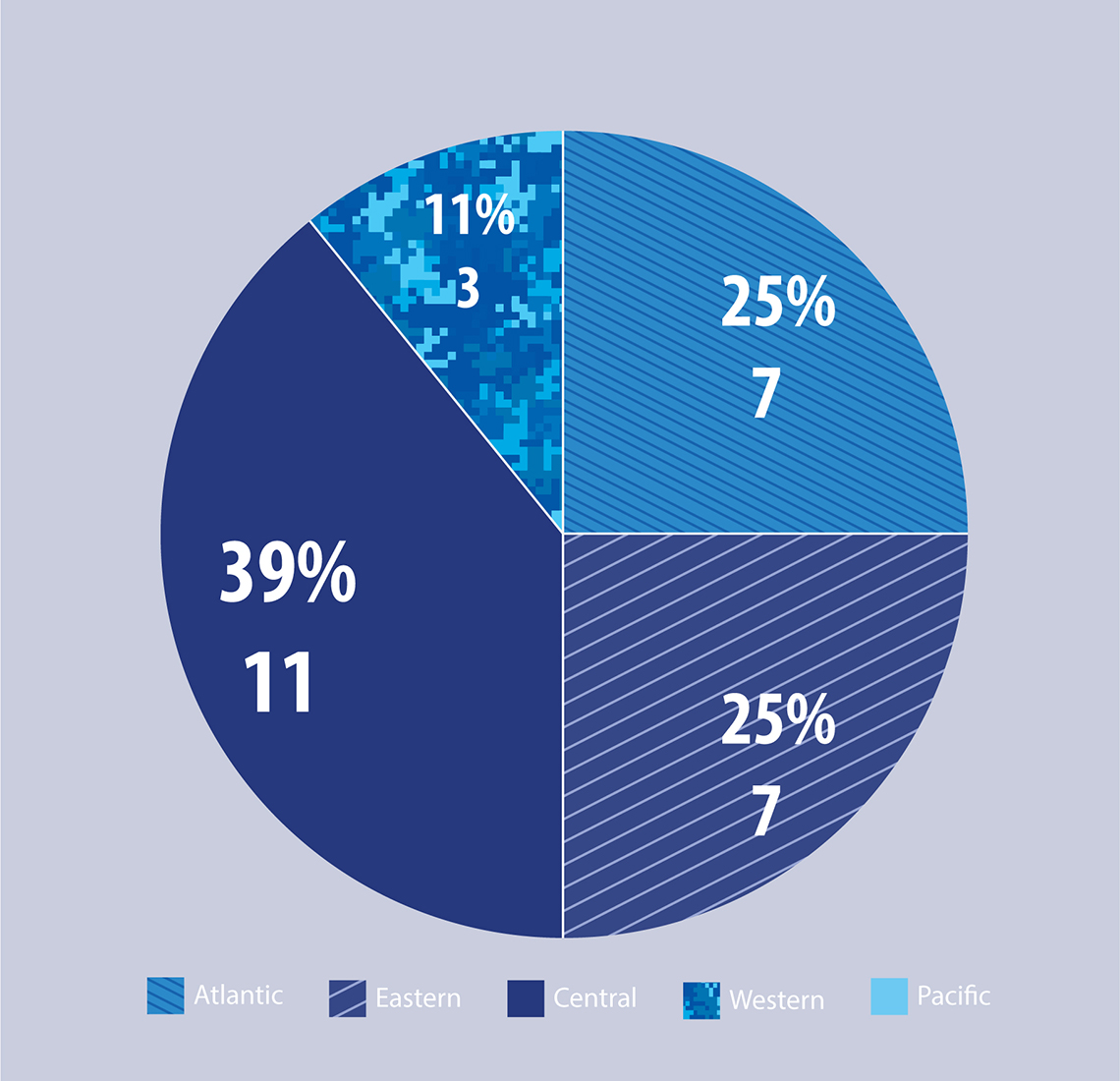
For graph breakdown, please refer to the table below:
| Number | Percentage | |
|---|---|---|
| Atlantic | 7 | 25% |
| Eastern | 7 | 25% |
| Central | 11 | 39% |
| Western | 3 | 11% |
| Pacific | 0 | 0% |
List of courts martial for sexual misconduct offences during the reporting period (details can be found at annex D):
- SCM Capt Bannister
- GCM OS Betts
- SCM WO Buenacruz (Ret’d)
- SCM Cpl Cadieux
- SCM Lt(N) Clark
- SCM MS Cooper
- SCM Sgt Covyeow
- SCM Capt Duvall
- SCM Sgt Euper
- SCM Cpl Furtado
- SCM Cpl Gobin
- SCM WO Grant
- SCM Cdr Mensah
- SCM Cpl Miszczak
- SCM OCdt Morgado
- SCM MCpl Obele Ngoudni #1
- SCM Cpl Quirion
- SCM Cpl Riddell
- SCM MCpl W.
- GCM PO2 Wilks
| Table 4 | ||||||
|---|---|---|---|---|---|---|
| Sexual Misconduct Offences | 2012/13 | 2013/14 | 2014/15 | 2015/16 | 2016/17 | 2017/18 |
| Referrals Received for SMs | 14 | 12 | 11 | 12 | 21 | 40 |
| Total Referrals Received During FY | 125 | 118 | 11 | 98 | 126 | 118 |
| SMs as % of Total Referrals Received | 11.20% | 10.17% | 10.89% | 12.24% | 16.67% | 34.19% |
| Preferrals for SMs During FY (Regardless of Date Received) | 10 | 10 | 7 | 13 | 19 | 34 |
| Totals Preferrals During FY | 95 | 82 | 60 | 62 | 82 | 69 |
| SMs as % of Total Preferrals | 10.53% | 12.20% | 11.67% | 20.97% | 23.17% | 49.28% |
| Courts Martial Completed for Sexual Misconduct | 8 | 6 | 10 | 7 | 12 | 20 |
| Total Courts Martial Completed | 64 | 67 | 71 | 47 | 56 | 62 |
| SMs as % of Total CMs Completed | 12.50% | 8.96% | 14.08% | 14.89% | 21.43% | 32.26% |
| Guilty Verdicts | 5 | 4 | 5 | 7 | 10 | 15 |
3.8.2 Drug Offences
Like all Canadians, persons subject to the CSD are liable to prosecution for drug-related offences as provided in the CDSA. Unlike the civilian population, however, persons subject to the CSD are also liable to prosecution for drug use27. Such offence will be prosecuted using section 129 of the NDA.
During the reporting period there were only two courts martial completed for drug offences. Both were held in the Atlantic region (details can be found at annex D):
- SCM Pte Burrell
- SCM LS Smith
There were 5 preferrals for drug offences during the reporting period.
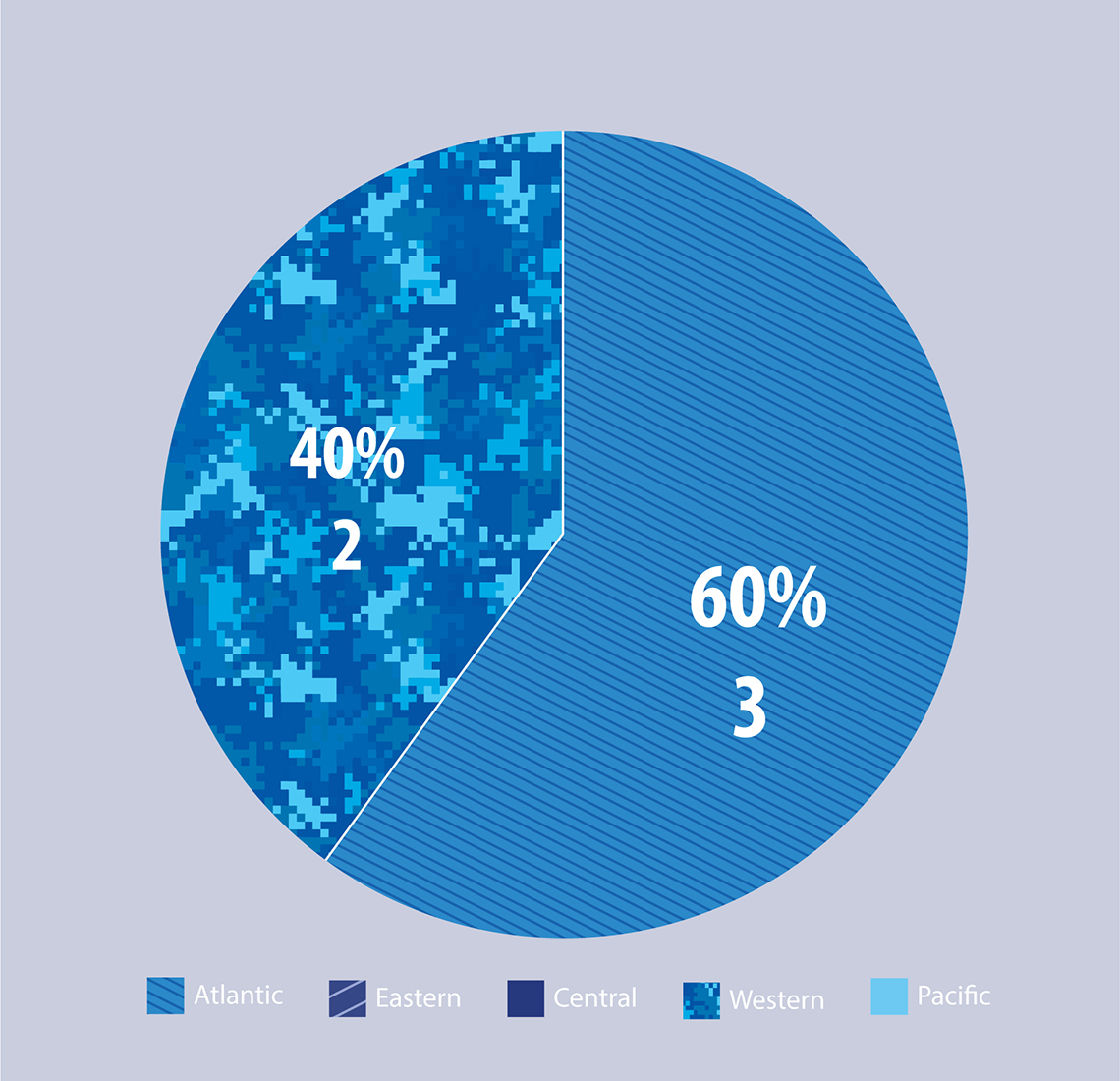
For graph breakdown, please refer to the table below:
| Number | Percentage | |
|---|---|---|
| Atlantic | 3 | 60% |
| Eastern | 0 | 0% |
| Central | 0 | 0% |
| Western | 2 | 40% |
| Pacific | 0 | 0% |
3.8.3 Fraud and Other Offences against Property
List of courts martial for fraud and other offences against property during the reporting period (details can be found at annex D):
- SCM Cpl Chabot-Leroux
- SCM MS De Nobile
- GCM MCpl Edmunds
- SCM MBdr Gaffey
- SCM Cpl Kroetsch
- SCM Cpl Whaley
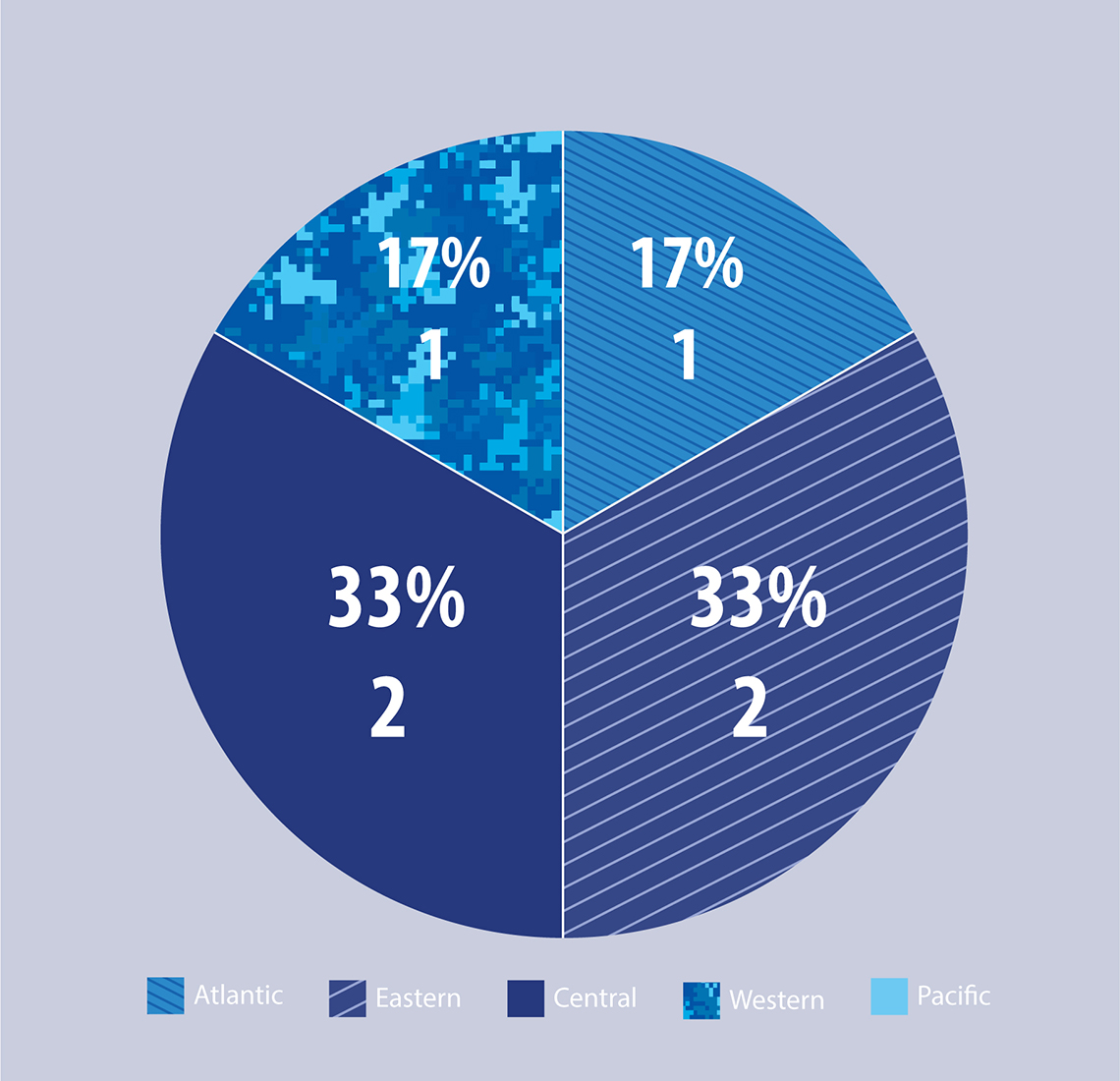
For graph breakdown, please refer to the table below:
| Number | Percentage | |
|---|---|---|
| Atlantic | 1 | 17% |
| Eastern | 2 | 33% |
| Central | 2 | 33% |
| Western | 1 | 17% |
| Pacific | 0 | 0% |
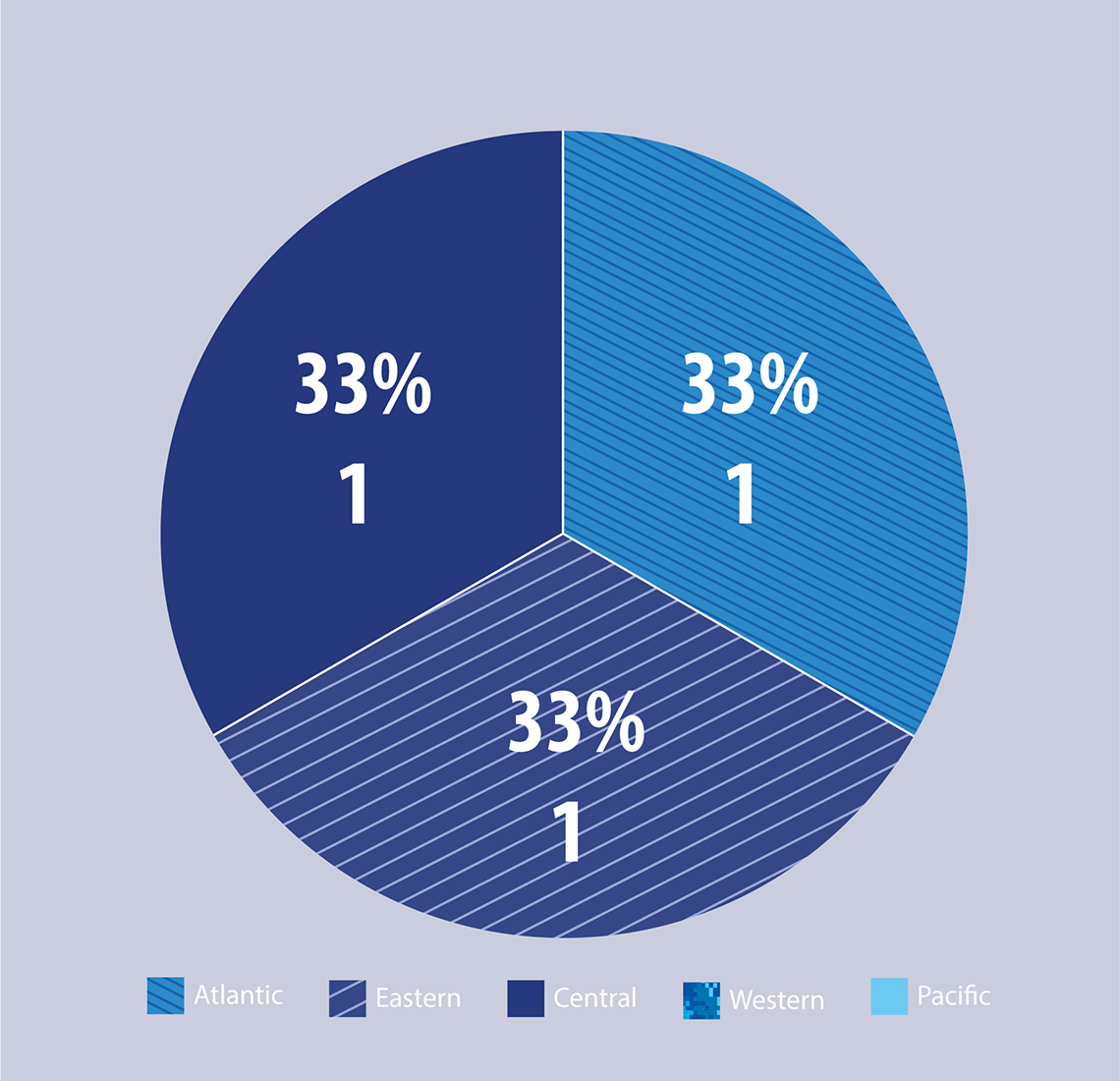
For graph breakdown, please refer to the table below:
| Number | Percentage | |
|---|---|---|
| Atlantic | 1 | 33% |
| Eastern | 1 | 33% |
| Central | 1 | 33% |
| Western | 0 | 0% |
| Pacific | 0 | 0% |
3.8.3 Fraud and Other Offences against Property
List of courts martial for fraud and other offences against property during the reporting period (details can be found at annex D):
- SCM Cpl Chabot-Leroux
- SCM MS De Nobile
- GCM MCpl Edmunds
- SCM MBdr Gaffey
- SCM Cpl Kroetsch
- SCM Cpl Whaley
3.8.4 Military Conduct Offences
List of courts martial for military conduct offences during the reporting period (details can be found at annex D):
- SCM Cpl Ayers
- SCM OCdt Baluyot
- SCM Cpl Belleview
- SCM Sgt Burton
- SCM LCdr Carlyon
- SCM Cpl Dickey
- GCM WO Dowe
- SCM 2Lt Ghaffari
- SCM Cpl Gibbons
- SCM Capt Gillespie
- SCM Spr Grening
- SCM Cdr Hopkie
- SCM Cpl Ladet
- SCM Cpl Lafrenière
- SCM MCpl Leadbetter
- SCM LS MacDonald
- SCM Lt(N) Makow
- SCM MCpl Matarewicz
- SCM Capt Matte
- SCM Cpl Newton
- SCM Pte Normand-Therrien
- SCM MCpl Obele Ngoudni #2
- SCM Sgt Ogston
- SCM Cpl Parent
- SCM MCpl Penner
- SCM Cpl Rollman
- SCM MWO Scotto D’anielo
- SCM Sgt Shulaev
- SCM Maj Skrok
- GCM Ex-Cpl Stuart
- SCM Sig Truelove
- SCM Sgt Williams
- SCM MCpl Wylie
- SCM MCpl Young
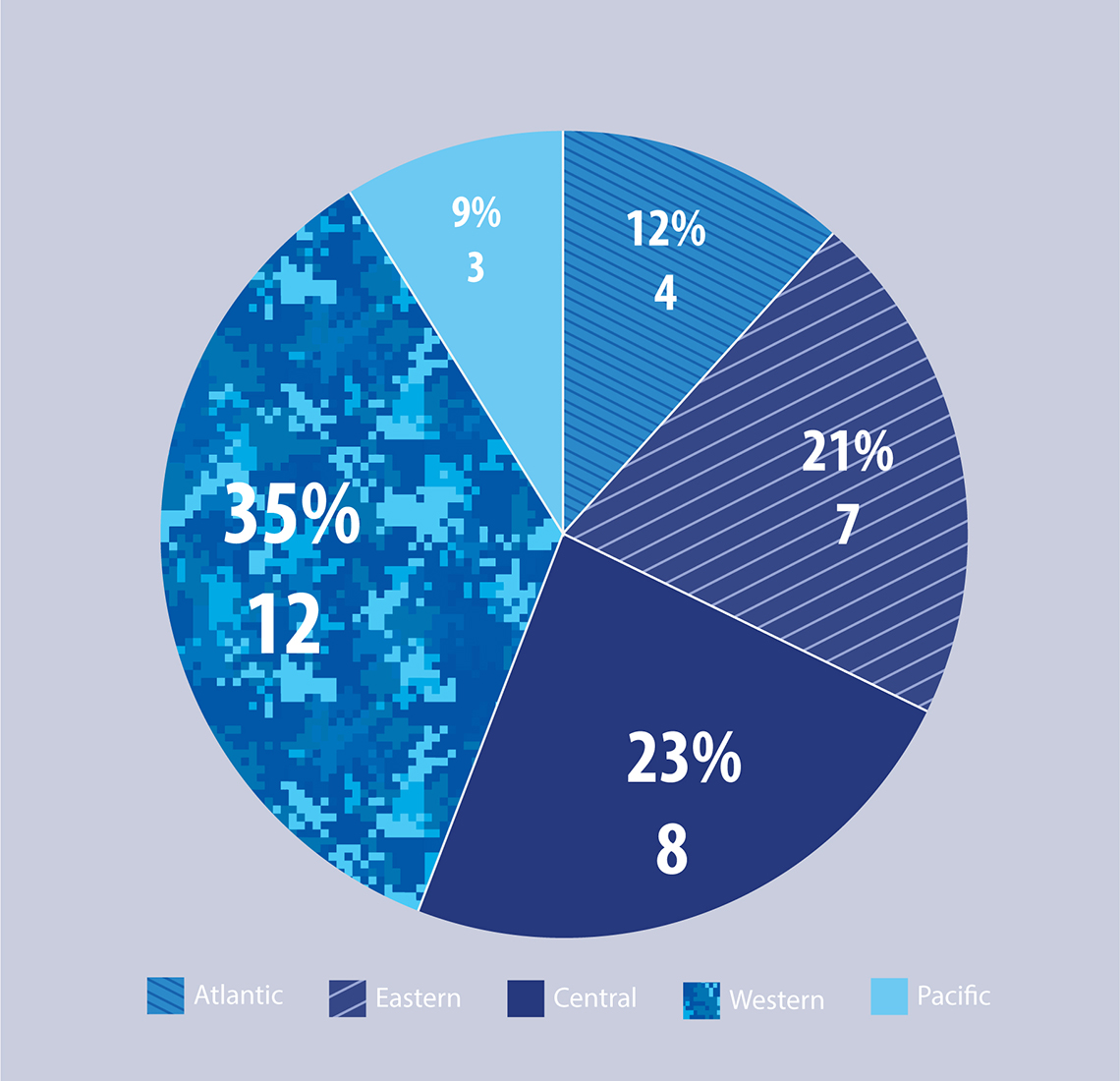
For graph breakdown, please refer to the table below:
| Number | Percentage | |
|---|---|---|
| Atlantic | 4 | 12% |
| Eastern | 7 | 21% |
| Central | 8 | 23% |
| Western | 12 | 35% |
| Pacific | 3 | 9% |
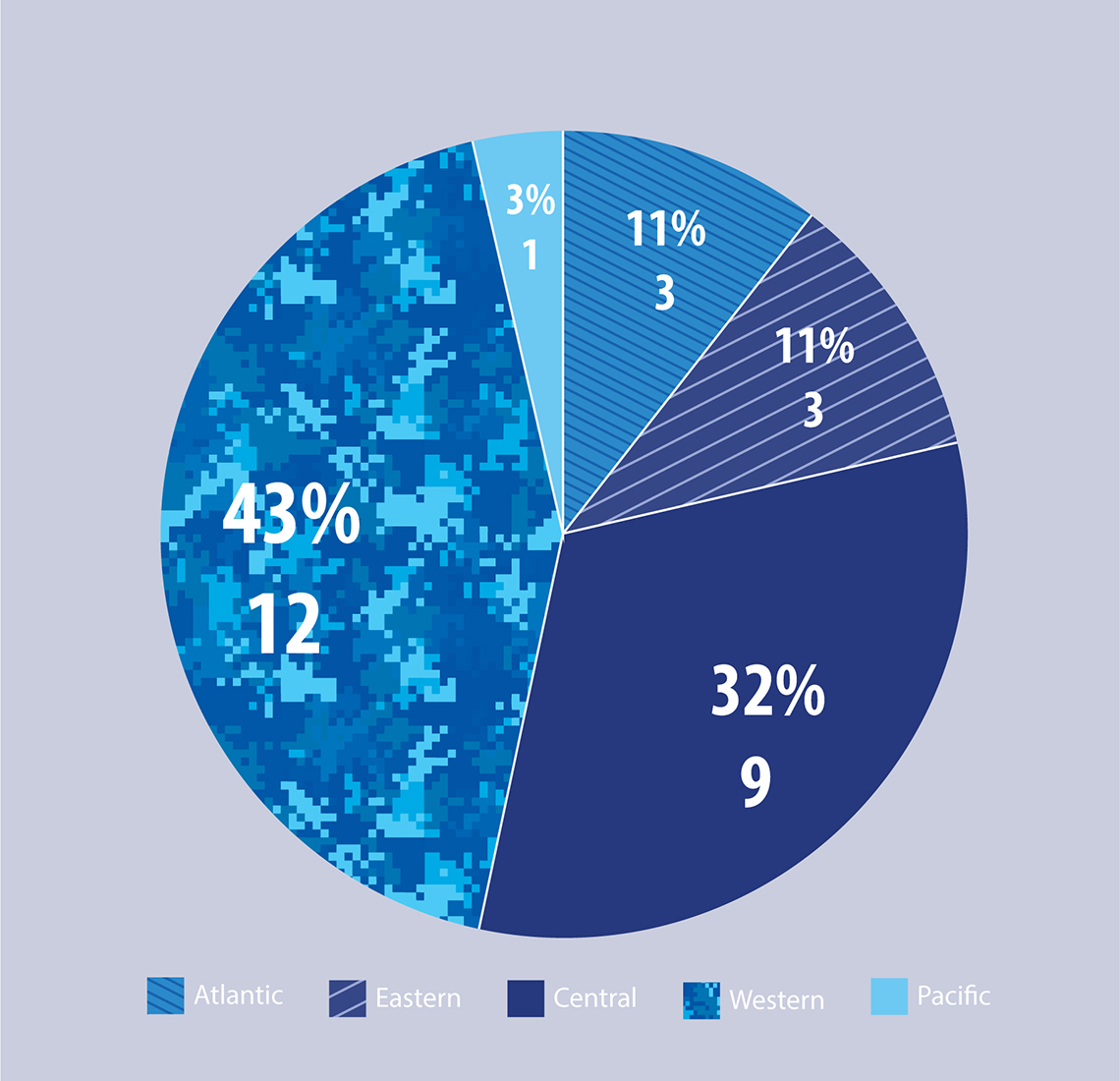
For graph breakdown, please refer to the table below:
| Number | Percentage | |
|---|---|---|
| Atlantic | 3 | 11% |
| Eastern | 3 | 11% |
| Central | 9 | 32% |
| Western | 12 | 43% |
| Pacific | 1 | 3% |
3.8.5 Section 129 of the National Defence Act
Subsection 129(1) of the NDA is broad and covers any act, conduct, disorder or neglect to the prejudice of good order and discipline. Every person convicted is liable to dismissal with disgrace from Her Majesty’s service or to less punishment.
During the reporting period, a total of 26 accused have faced 45 charges under section 129 of the NDA, of which 32 were for conduct, 7 for neglect and 6 for an act to the prejudice of good order and discipline.
List of courts martial with charges under section 129 of the NDA (details can be found at annex D):
- SCM Capt Bannister
- GCM OS Betts
- SCM WO Buenacruz (Ret’d)
- SCM LCdr Carlyon
- SCM Lt(N) Clark
- SCM Sgt Covyeow
- SCM MBdr Gaffey
- SCM Cpl Gibbons
- SCM Capt Gillespie
- SCM Cdr Hopkie
- SCM MCpl Leadbetter
- SCM LS MacDonald
- SCM Lt(N) Makow
- SCM Capt Matte
- SCM Cdr Mensah
- SCM Cpl Miszczak
- SCM Cpl Newton
- SCM MCpl Obele Ngoudni #2
- SCM Sgt Ogston
- SCM MCpl Penner
- SCM Cpl Rollman
- SCM Maj Skrok
- GCM Ex-Cpl Stuart
- SCM MCpl W.
- SCM Sgt Williams
- SCM MCpl Wylie
3.8.6 Section 130 of the National Defence Act
As indicated earlier, section 130 of the NDA incorporate by reference offences that are punishable under the Criminal Code or any other Act of Parliament. The essential elements of the underlying federal offences remain the same.
Over the reporting period, 86 charges were preferred under section 130 of the NDA in relation to 30 accused. The charges were preferred in relation to the following federal offences:
- Section 86(1) of the Criminal Code – Careless use of firearm (2 charges);
- Section 86(2) of the Criminal Code – Contravention of a regulation under paragraph 117(h) of the Firearms Act (1 charge);
- Section 87(1) of the Criminal Code – Pointing a firearm (1 charge);
- Section 88 of the Criminal Code – Possession of a weapon for a dangerous purpose (1 charge);
- Section 91(1) of the Criminal Code – Unauthorized possession of a firearm (1 charge);
- Section 122 of the Criminal Code – Breach of trust by a public officer (17 charges);
- Section 151 of the Criminal Code – Sexual interference (1 charge);
- Section 162.1 of the Criminal Code – Publication of an intimate image without consent (1 charge);
- Section 162.1(a) of the Criminal Code – Voyeurism (1 charge);
- Section 163.1(2) of the Criminal Code – Making child pornography (1 charge);
- Section 163.1(4) of the Criminal Code – Possession of child pornography (2 charges);
- Section 264(1) of the Criminal Code – Criminal harassment (1 charge);
- Section 264.1(1) of the Criminal Code – Uttering threats to cause death or bodily harm (9 charges);
- Section 265(1) of the Criminal Code – Assault (1 charge);
- Section 266 of the Criminal Code – Assault (10 charges);
- Section 271 of the Criminal Code – Sexual assault (9 charges);
- Section 286.1(1) of the Criminal Code – Obtaining sexual services for consideration (1 charge);
- Section 334 of the Criminal Code – Theft (2 charges);
- Section 337 of the Criminal Code – Public servant refusing to deliver property (1 charge);
- Section 355.2 of the Criminal Code – Trafficking in property obtained by crime (3 charges);
- Section 366(1)(a) of the Criminal Code – Made a forged document (1 charge);
- Section 368(1)(a) of the Criminal Code – Use of a forged document (1 charge);
- Section 380(1) of the Criminal Code – Fraud (8 charges);
- Section 430(1) of the Criminal Code – Mischief (2 charges);
- Section 463(b) of the Criminal Code – Attempted to defraud (1 charge);
- Section 4(1) of the CDSA – Possession (1 charge);
- Section 5(1) of the CDSA – Trafficking (2 charges);
- Section 5(2) of the CDSA – Possession for the purpose of trafficking (2 charges); and
- Section 7(2)(a.1) of the CDSA – Production of a substance (1 charge).
3.9 Appeals
3.9.1 Appeals to the Court Martial Appeal Court
3.9.1.1 Constitutionality of paragraph 130(1)(a) of the National Defence Act
Paragraph 130(1)(a) of the NDA makes it a service offence to commit offences punishable under other Acts of Parliament. In Moriarity, the SCC unanimously decided that paragraph 130(1)(a) of the NDA was not unconstitutionally overbroad and that there was no requirement for a military nexus for the provision to be consistent with section 7 of the Charter. Following this decision, numerous appellants raised a new ground of appeal before the CMAC alleging that paragraph 130(1)(a) of the NDA violated their right to a jury trial contrary to section 11(f) of the Charter. Section 11(f) of the Charter provides that anyone charged with an offence has the right:
except in the case of an offence under military law tried before a military tribunal, to the benefit of trial by jury where the maximum punishment for the offence is imprisonment for five years or a more severe punishment…
Three separate panels of the CMAC have now heard arguments on this matter. During the previous reporting period, the CMAC ruled that paragraph 130(1)(a) of the NDA did not violate section 11(f) of the Charter and did not require a military nexus (R v Master Corporal Royes, 2016 CMAC 1). During this reporting period, a second panel rendered its decision in R v Private Déry et al., 2017 CMAC 2 – which included the cases of Petty Officer Second Class Blackman, Warrant Officer Gagnon, Corporal Thibault, Private Déry, Second Lieutenant Soudri, Lieutenant (Navy) Klein, Corporal Nadeau-Dion, Corporal Pfahl, Petty Officer Second Class Wilks, Master Corporal Stillman and Major Wellwood. The CMAC was unanimous that it was bound by its previous decision in Royes. However, JJ.A. Cournoyer and Gleason wrote extensive reasons as to why they would have found that paragraph 130(1)(a) of the NDA, absent a military nexus test, violated the right to a jury trial under section 11(f) of the Charter. C.J. Bell wrote separate reasons in support of the unanimous decision in Royes. The SCC granted leave to appeal this decision on 8 March 2018.
A third panel heard arguments on this issue on 30 January 2018 in the case of Corporal Beaudry. The CMAC has reserved its decision.
3.9.1.2 Other Questions of Law Heard on Appeal
R v Major Wellwood, 2017 CMAC 4
In addition to the Charter challenge in Déry, this case involved a challenge to the Chief Military Judge’s instructions to the General Court Martial panel. Maj Wellwood was convicted of obstructing a peace officer. The incident occurred when a corporal from the MP attended a command post location run by Maj Wellwood, in response to a 911 call regarding a potentially suicidal soldier. A confrontation ensued between Maj Wellwood and the MP officer.
The CMAC concluded that the military judge’s instructions to the panel were needlessly complex, and failed to properly relate the evidence to the law. The CMAC further concluded that the military judge failed to adequately address Maj Wellwood’s competing obligations toward the suicidal soldier and to what degree those obligations informed what was a reasonable and necessary exercise of police powers in the circumstances.
The CMAC confirmed that the principle of police independence applies to MP officers in the exercise of their law enforcement duties during their interactions with the chain of command. MP are not required to obey the orders of superior officers when those orders conflict with the exercise of their police duties.
The CMAC overturned the conviction and ordered a new trial. After further review by DMP following the appeal, it was decided not to prefer the matter for a second court martial.
R v Warrant Officer Gagnon, 2018 CMAC 1
In addition to the Charter challenge in Déry, this case involved a challenge to the Chief Military Judge’s decision to put the defence of honest but mistaken belief to the General Court Martial panel. WO Gagnon was acquitted of one count of sexual assault.
A majority of the CMAC found that the Chief Military Judge erred in law by submitting to the court martial panel a defence of honest but mistaken belief in consent without having considered whether the statutory preconditions in section 273.2 of the Criminal Code had been met. Section 273.2 required WO Gagnon to take reasonable steps in the circumstances known to him at the time to confirm consent to the sexual activities in question. Two of the three justices concluded that a judge applying the proper framework would likely consider that reasonable steps had not been taken, and would therefore have not put the defence of honest but mistaken belief in consent to the panel. On this basis, the CMAC overturned the acquittal and ordered a new trial.
The Chief Justice, in dissent, concluded that there was evidence of reasonable steps and an air of reality to the defence of honest but mistaken belief on the facts of the case sufficient to put the defence to the panel, and therefore there was no error.
WO Gagnon has appealed this decision as of right to the SCC. This appeal is expected to be heard on 16 October 2018.
R v Corporal Golzari, 2017 CMAC 3
Cpl Golzari was charged with obstructing a peace officer and conduct to the prejudice of good order and discipline resulting from an incident which occurred at the gate of CFB Kingston while the base was on high alert. At his court martial, the Chief Military Judge found that the prosecution had failed to lead any evidence that Cpl Golzari knew that the MP officer he was interacting with was a peace officer, and any evidence that there was a standard of conduct that had been breached by Cpl Golzari.
The CMAC unanimously concluded that the Chief Military Judge erred in this determination. With respect to the obstruction charge, the CMAC noted that MP are always peace officers in relation to persons subject to the CSD and that the knowledge component of the offence was complete when Cpl Golzari knew he was dealing with a MP officer. With respect to the conduct charge, the CMAC concluded that the prosecution is not required to prove a separate standard of conduct. The offence prohibits any conduct that is prejudicial to good order and discipline. The element of prejudice requires conduct that tends to, or is likely to, adversely affect good order and discipline. The CMAC further noted that, in most cases, the trier of fact should be able to conclude whether the proven conduct is prejudicial to good order and discipline based on their experience and general service knowledge.
The CMAC granted the appeal and ordered a new trial. After further review by DMP following the appeal, it was decided not to prefer the matter for a second court martial.
R v Corporal Hoekstra, 2017 CMAC 5
Cpl Hoekstra pled guilty to possession of marijuana, possession of explosives, unlawful possession of a firearm, and receiving property obtained by the commission of a service offence. The prosecution recommended a sentence of 18 months imprisonment. Defence counsel suggested a sentence of 60-90 days detention, a severe reprimand and a significant fine, or alternatively, 90 days detention and a reduction in rank to private. The military judge sentenced Cpl Hoekstra to 60 days imprisonment.
The CMAC unanimously concluded that the sentence was demonstrably unfit, and that an appropriate sentence for this offence was 14 months imprisonment. Upon the admission of fresh evidence of Cpl Hoekstra’s rehabilitative efforts and post-offence good conduct, and with the agreement of the prosecution, the CMAC stayed the remaining period of imprisonment.
R v Master Corporal Edmunds
MCpl Edmunds ran a fraudulent scheme whereby he contracted on behalf of the CAF with himself as a sole proprietor. After pleading guilty to one count of fraud over $5000 involving two fraudulent transactions, he was charged with several additional counts of fraud which resulted in a second trial. He was sentenced to 30 days imprisonment at his first trial. At his second trial, MCpl Edmunds argued that the conduct of the investigators and prosecution was abusive, mainly alleging that the prosecution had improperly split its case. The issues at appeal arose from this second trial.
During a pre-trial disclosure and abuse of process application, the charge-layer testified that he did not know any information about the charges. He had been presented with a draft Record of Disciplinary Proceedings and had simply signed it. The military judge found that the charge-layer did not have an actual and reasonable belief that an offence had been committed, incorporating this finding into his decision on the abuse of process application.
In his decision on the abuse of process, the military judge found that the prosecution had not acted in bad faith or maliciously, but concluded that subjecting MCpl Edmunds to two trials was an abuse of process. The military judge concluded that the prejudice arising from this abuse was the possibility that MCpl Edmunds would be subjected to two separate periods of incarceration. He concluded that this prejudice could be remedied through mitigation of sentence.
MCpl Edmunds appealed the military judge’s refusal to grant a stay of proceedings. After a review of the appeal record, the DMP agreed that the error at the charge laying stage was fatal to the charges and that the court martial had therefore been without jurisdiction. This vitiated the proceedings and required the CMAC to quash the conviction. The CMAC agreed, declaring the court martial a nullity and overturning the conviction.
3.9.1.3 Upcoming Appeals to the CMAC
R v Corporal Cadieux
Cpl Cadieux was acquitted at a Standing Court Martial of sexual assault and drunkenness. The DMP appealed the acquittal on the basis that the military judge erred in his assessment of the defence of honest but mistaken belief in consent, in his assessment of witness credibility, and in his interpretation of the offence of drunkenness under section 97 of the NDA.
The CMAC heard oral arguments in this case on 12 March 2018 and reserved its decision.
R v Corporal Beaudry
This was the third time in which the CMAC heard constitutional arguments as to whether section 130(1)(a) of the NDA violates the right to a jury trial contrary to section 11(f) of the Charter.
The CMAC heard final oral arguments on 30 January 2018 and reserved its decision.
R v Captain Bannister
Capt Bannister was acquitted at a Standing Court Martial of two counts of disgraceful conduct and two counts of conduct to the prejudice of good order and discipline for inappropriate sexual comments made in the workplace. The DMP appealed the acquittal on the basis that the military judge erred in his interpretation of the offence of disgraceful conduct and erred in his interpretation of prejudice to good order and discipline.
The Notice of Appeal was filed on 29 March 2018.
Annex E provides additional information regarding appeals to the CMAC.28
3.9.2 Upcoming Appeals to the Supreme Court of Canada
R v Master Corporal Stillman et al.
Following the CMAC decision in Déry, a number of the appellants sought leave to appeal to the SCC. The SCC granted leave to appeal on 8 March 2018. Seven of the appellants have now filed their Notice of Appeal. The questions on appeal are: Does paragraph 130(1)(a) of the NDA violate section 11(f) of the Charter; and if so, is the infringement a reasonable limit prescribed by law as can be demonstrably justified in a free and democratic society under section 1 of the Charter.
On 11 April 2018, the SCC granted the appellants’ motion to extend the time for filing written submissions until eight weeks after the CMAC renders its decision in the Beaudry matter.
R v Warrant Officer Gagnon
As indicated previously, WO Gagnon appealed the decision of the CMAC as of right. The Notice of Appeal was filed on 5 March 2018. A tentative hearing date is scheduled for 16 October 2018.
Annex F provides additional information regarding appeals to the SCC29.
Conclusion
In addition to general legal advice provided by CMPS on a regular basis to DJAs and CFNIS, RMPs have handled 199 referrals from the chain of command (118 of those having been received in 2017-2018), closed 132 cases, worked on 14 appeals (all at the CMAC) and provided pre-charge advice in relation to 126 files (with an additional 3 files still pending) during the reporting period. Overall, CMPS handled 342 files in FY 2017-2018. This is 42 files more than in 2016-2017 which was our busiest year in the last 5 years. This was accomplished even though our Reserves RMPs could not be as active as last year. Training invested in the RMPs the previous year and this year and the increase of experience appears to have helped in achieving these results.
Footnotes
17 Files carried over from FY 2016-2017 includes those files where a post-charge decision was still pending, supplementary investigations were requested but not yet received, cases were awaiting a trial date or the courts martial were not yet completed.
18 A file is considered closed either through the conclusion of court martial proceedings, through non-preferral of charges or through withdrawal of charges.
19 The interests of the accused are usually represented at reviews of pre-trial custody, courts martial and appeals from courts martial to the CMAC and SCC by the DDCS. Representation by DDCS is provided at public expense. The accused may choose to retain counsel at his or her own expense.
20 NDA, s. 159.
21 NDA, s. 159.8.
22 NDA, s. 248.1.
23 Sections 139(1) and 146 NDA.
24 2016 SCC 27
25 2016 CM 4015.
26 See NDA sections 70 and 130. A service tribunal shall not try any person charged with any of the following offences committed in Canada: murder; manslaughter or an offence under any of sections 280 to 283 of the Criminal Code.
27 QR&O, article 20.04.
28 Further information may also be obtained by accessing the CMAC website:http://www.cmac-cacm.ca/index-eng.shtml.
29 Further information may also be obtained by accessing the SCC website: http://www.scc-csc.gc.ca/case-dossier/info/hear-aud-eng.aspx?ya=2015&ses=03&submit=Search.